The Trump Election Immunity Ruling, Annotated
A unanimous ruling by a three-judge panel of the U.S. Court of Appeals for the District of Columbia rejected former President Donald J. Trump’s claim that he was immune to charges of plotting to subvert the results of the 2020 election. Mr. Trump is expected to appeal to the Supreme Court.
The New York Times annotated the indictment.
Download the original PDF.


New York Times Analysis
Next »
President Trump Has Become Citizen Trump
1
The panel declares that even if a sitting president is temporarily immune from prosecution — something the Justice Department has asserted but the Supreme Court has never stated — a former president no longer has that protection.

New York Times Analysis
« Previous Next »
Innocent Until Proven Guilty
2
While saying that many of the efforts Trump and his supporters made to overturn his loss of the 2020 election were “allegedly criminal,” the panel emphasizes that his guilt is yet to be determined.

New York Times Analysis
« Previous Next »
Summarizing the Indictment
3
This part of the ruling goes through the criminal charges.
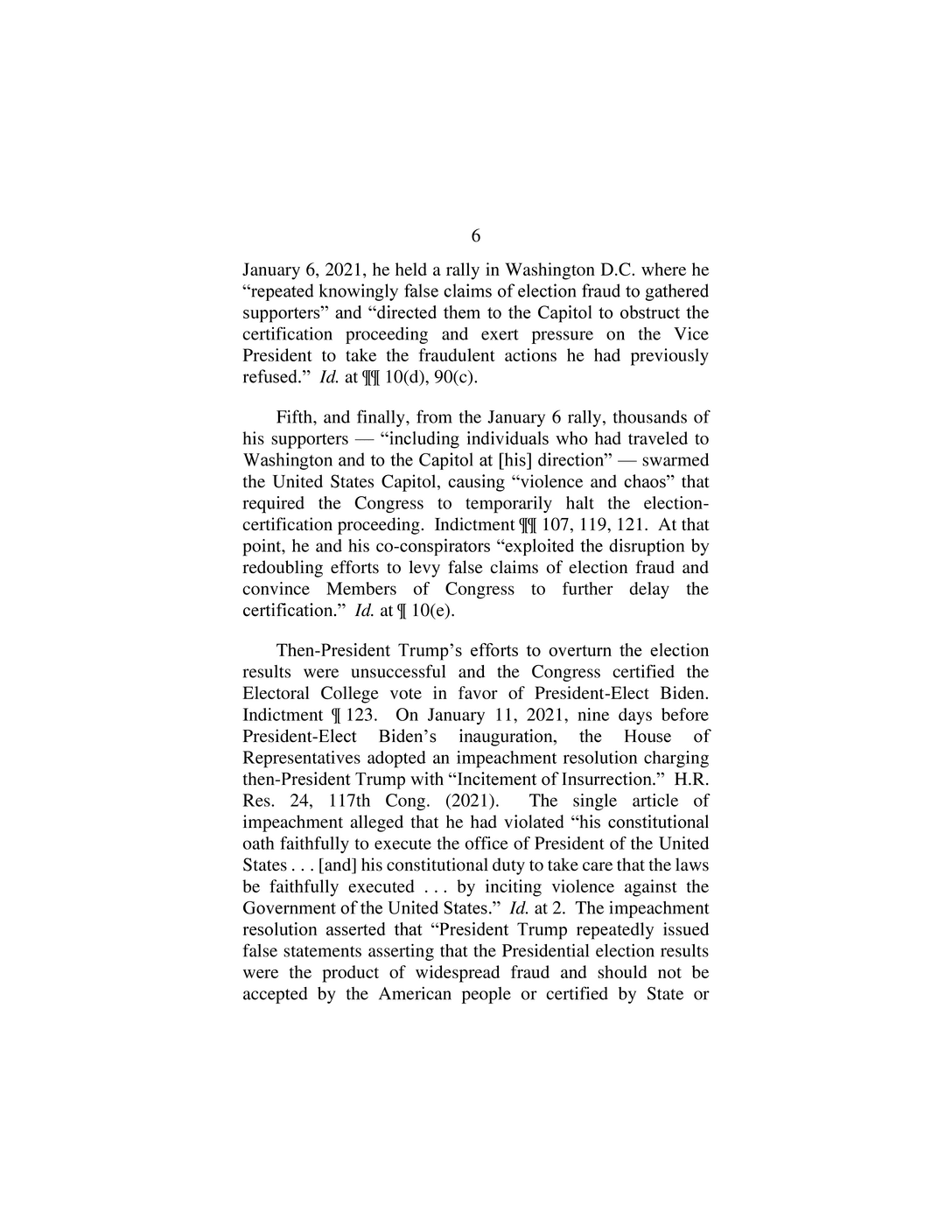
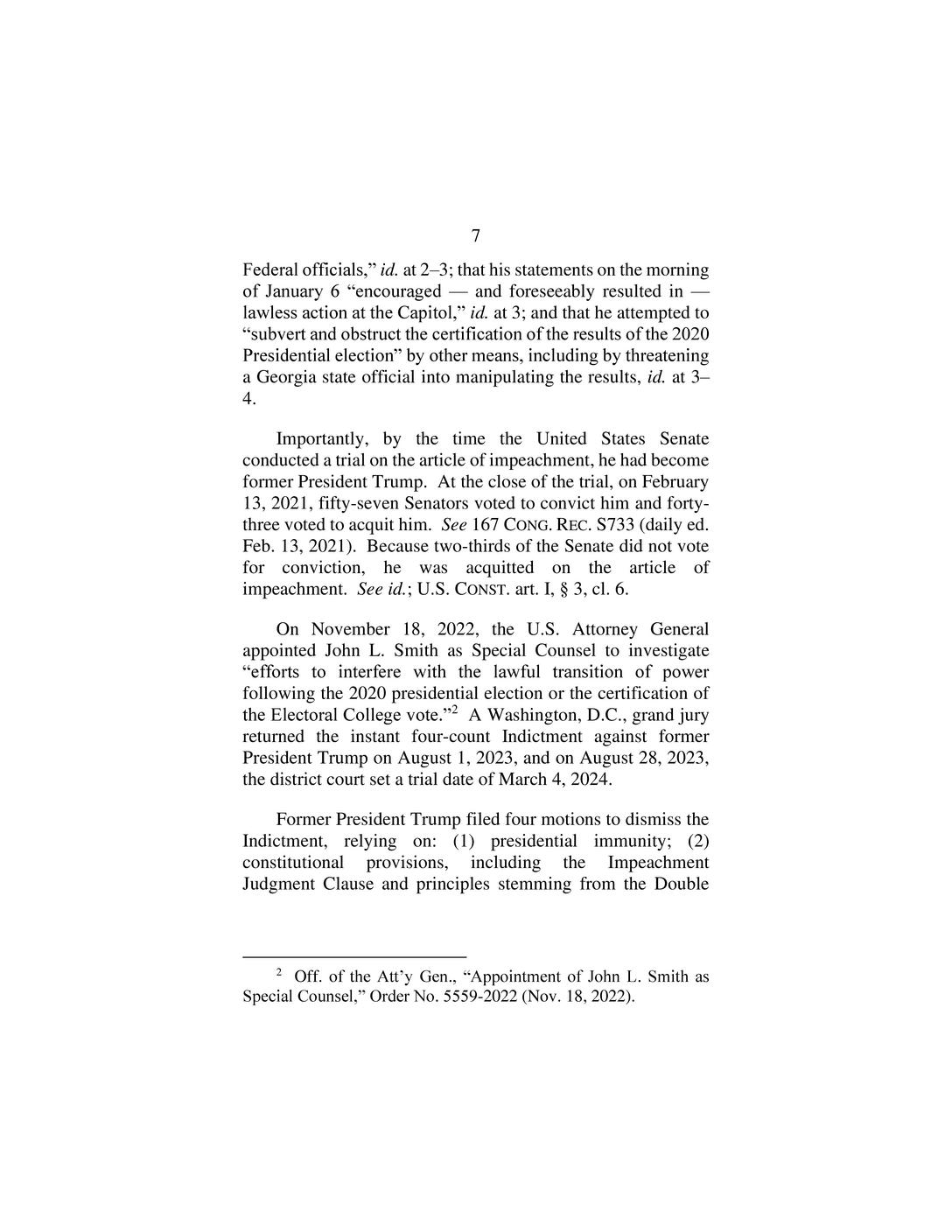
New York Times Analysis
« Previous Next »
Impeachment Acquittal
4
In noting that the Senate fell short of the two-thirds needed to convict Mr. Trump at his impeachment trial for inciting the Jan. 6 Capitol riot, the panel notes that an important factor was that he was no longer president by the time of that trial. Numerous Republican senators publicly cited that factor as a basis for their votes to acquit him.
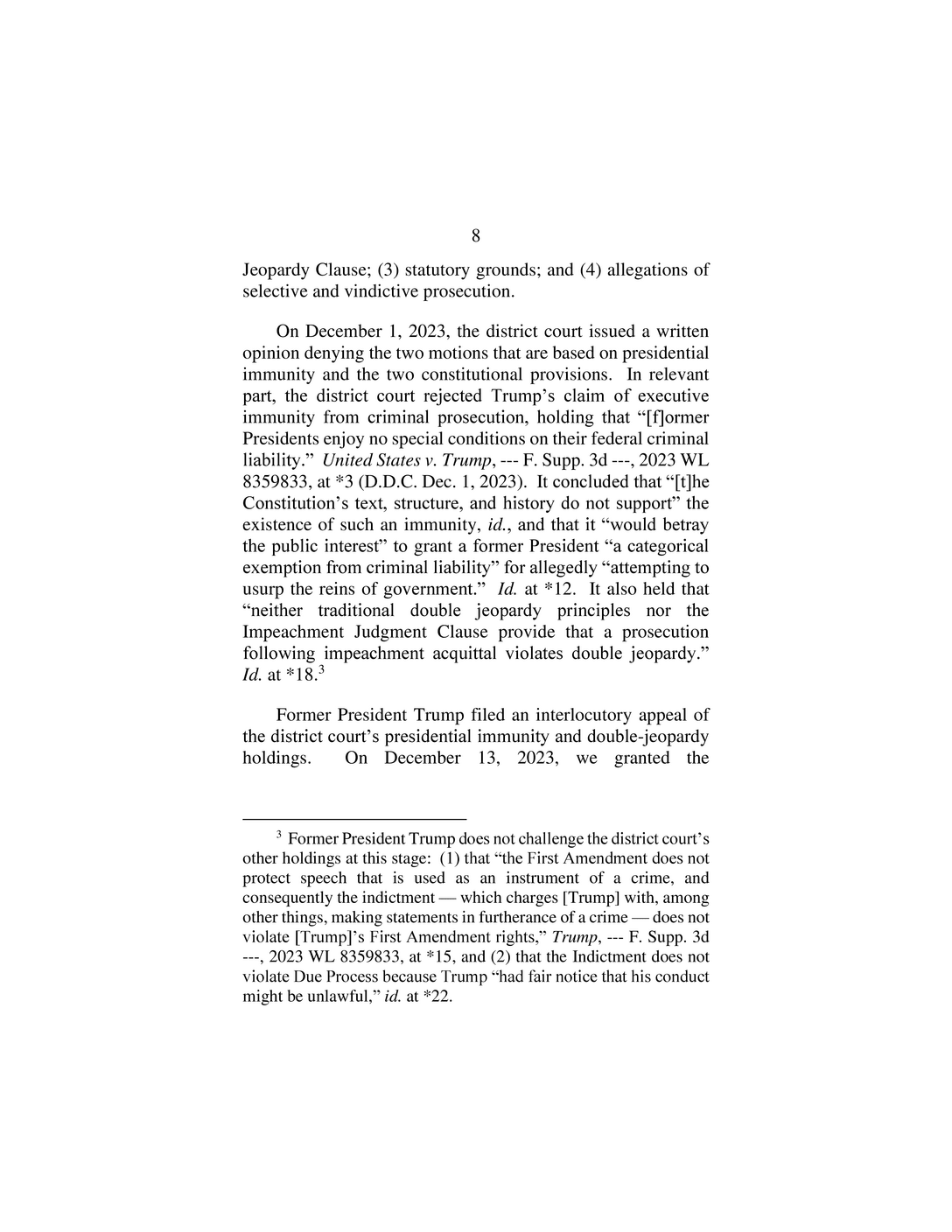
New York Times Analysis
« Previous Next »
The District Court Opinion
5
The panel summarizes the ruling by the Federal District Court judge overseeing the election case, Tanya S. Chutkan, late last year rejecting Trump’s immunity claim.
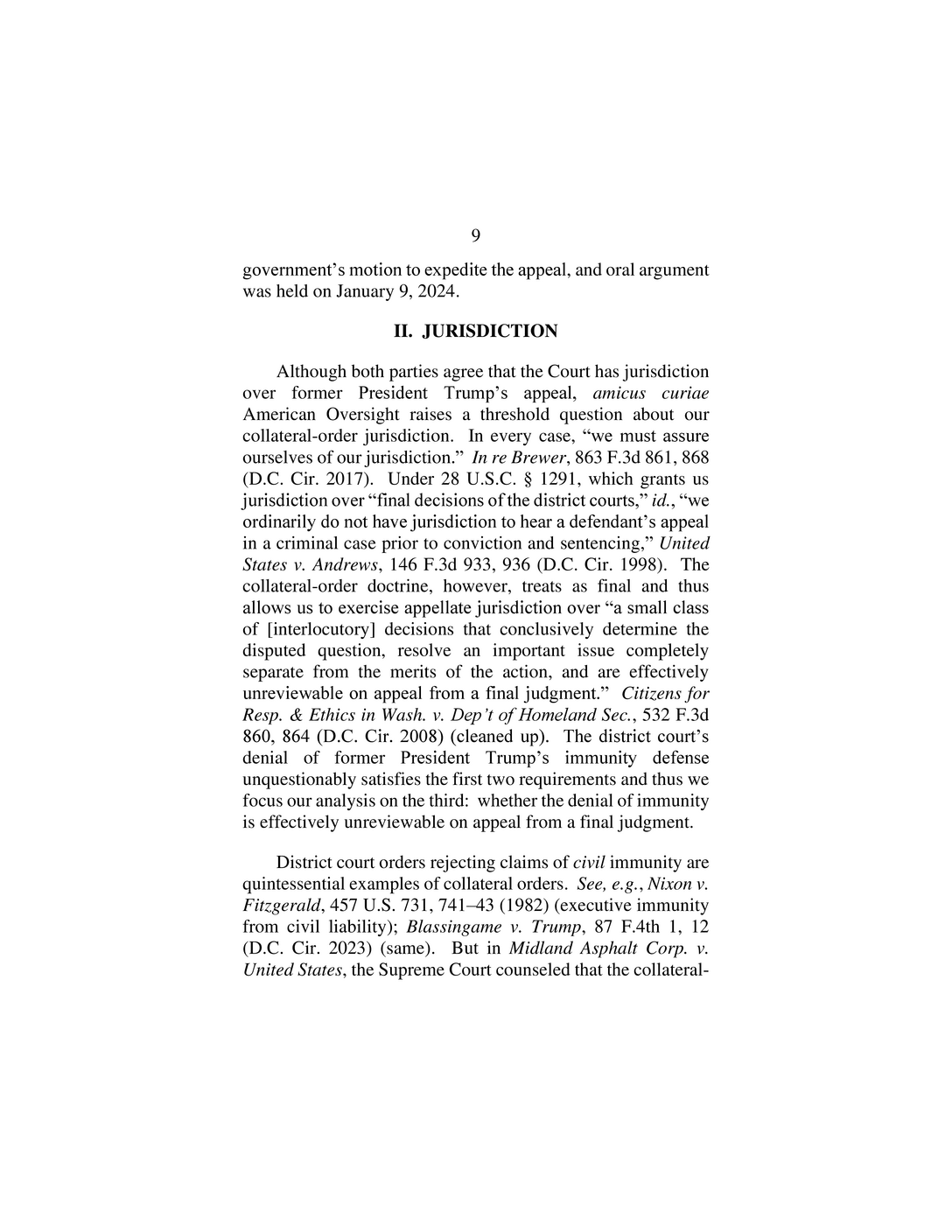
New York Times Analysis
« Previous Next »
Speed, Then Delay
6
The panel took nearly a month to hand down its ruling, a surprising delay given that it had set an expedited schedule for briefings and arguments. As weeks passed, speculation mounted over the potential role of Judge Karen L. Henderson, the sole Republican appointee on the panel, because she had ruled in favor of Mr. Trump in other disputes and opposed speeding up the case. Ultimately, however, the ruling was unanimous.
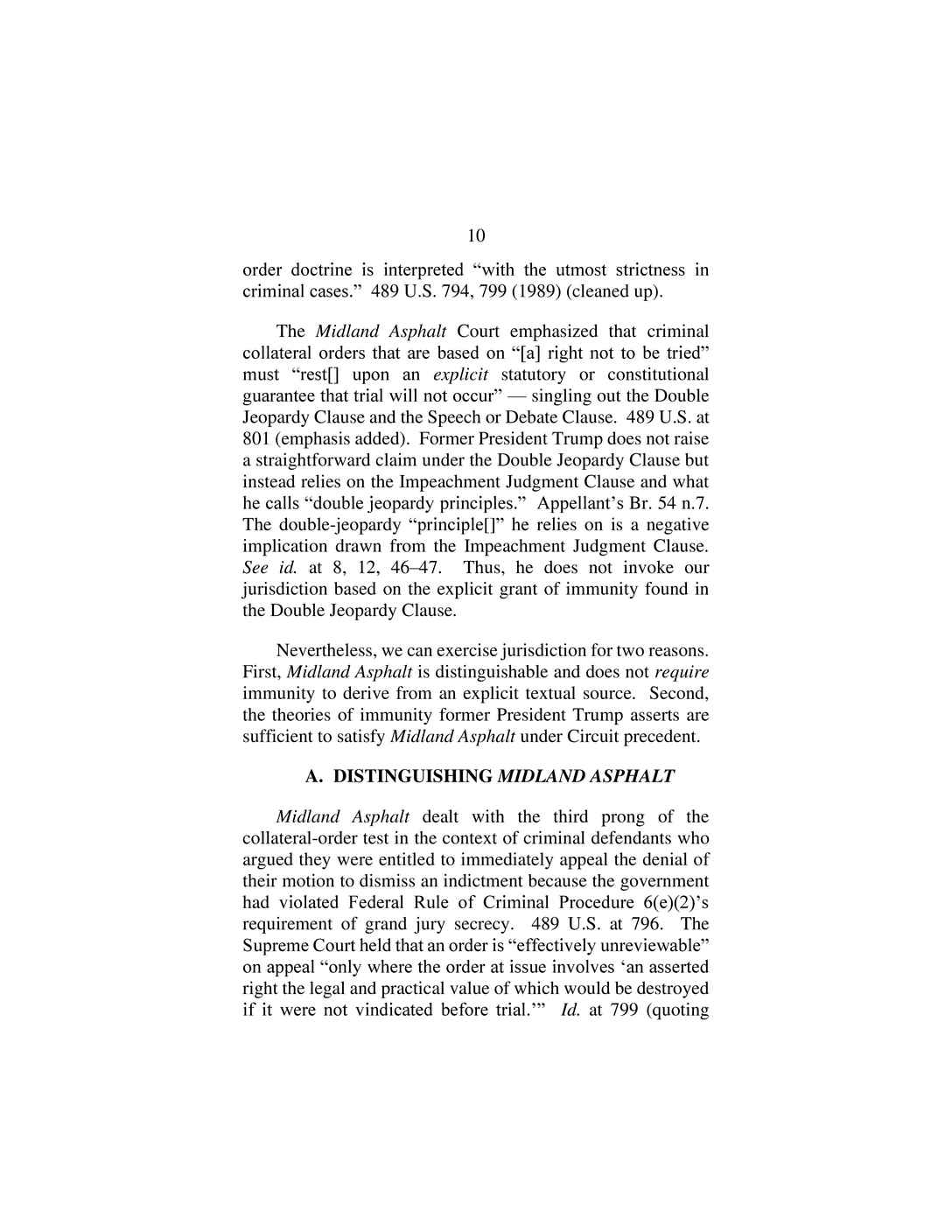
New York Times Analysis
« Previous Next »
Not Too Early to Decide
7
One question was whether Mr. Trump had brought the appeal too soon and whether he would need to wait for a trial before raising the claim of immunity should he be convicted. Both Mr. Trump and the Justice Department had urged the court to decide the immunity issue now, and the judges agreed they could do so without waiting.
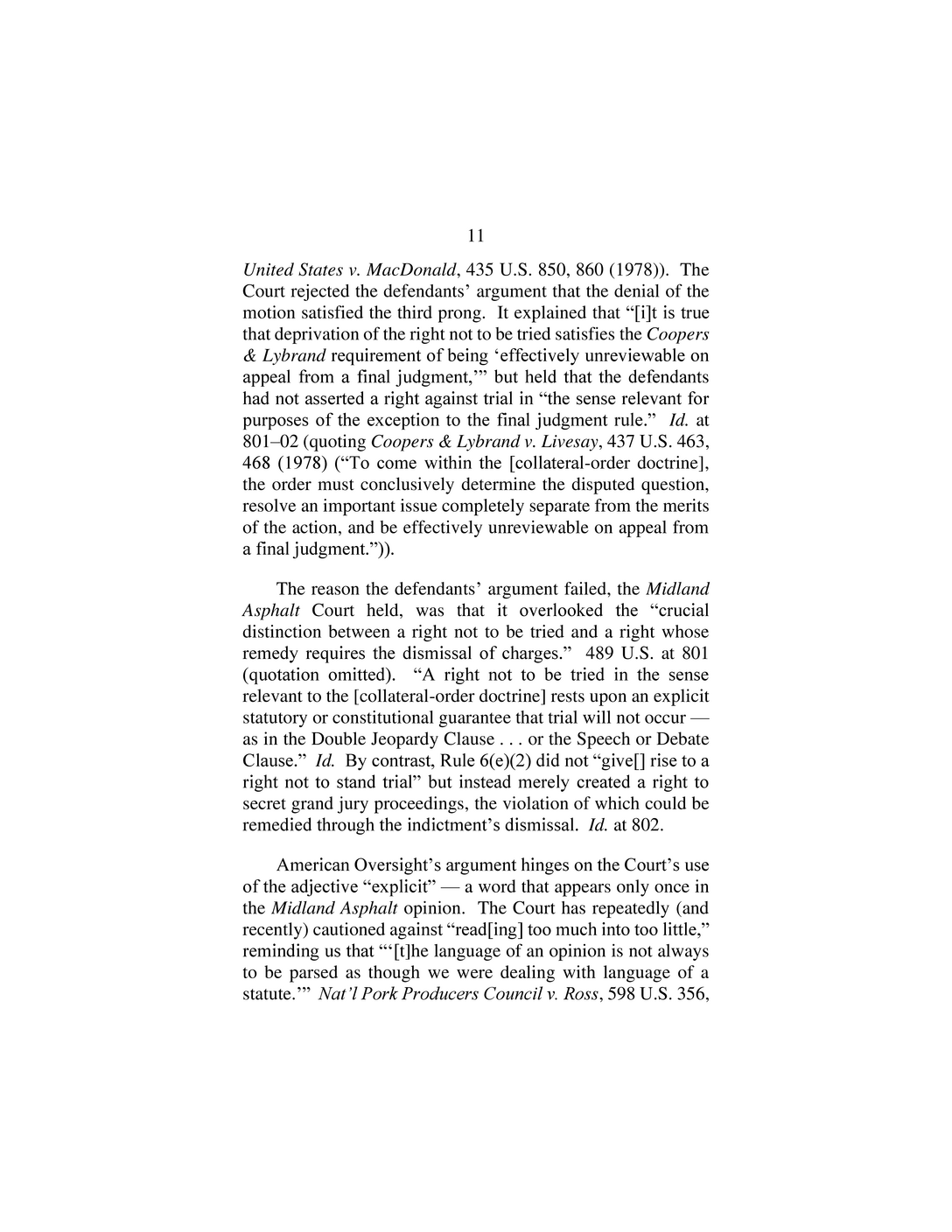
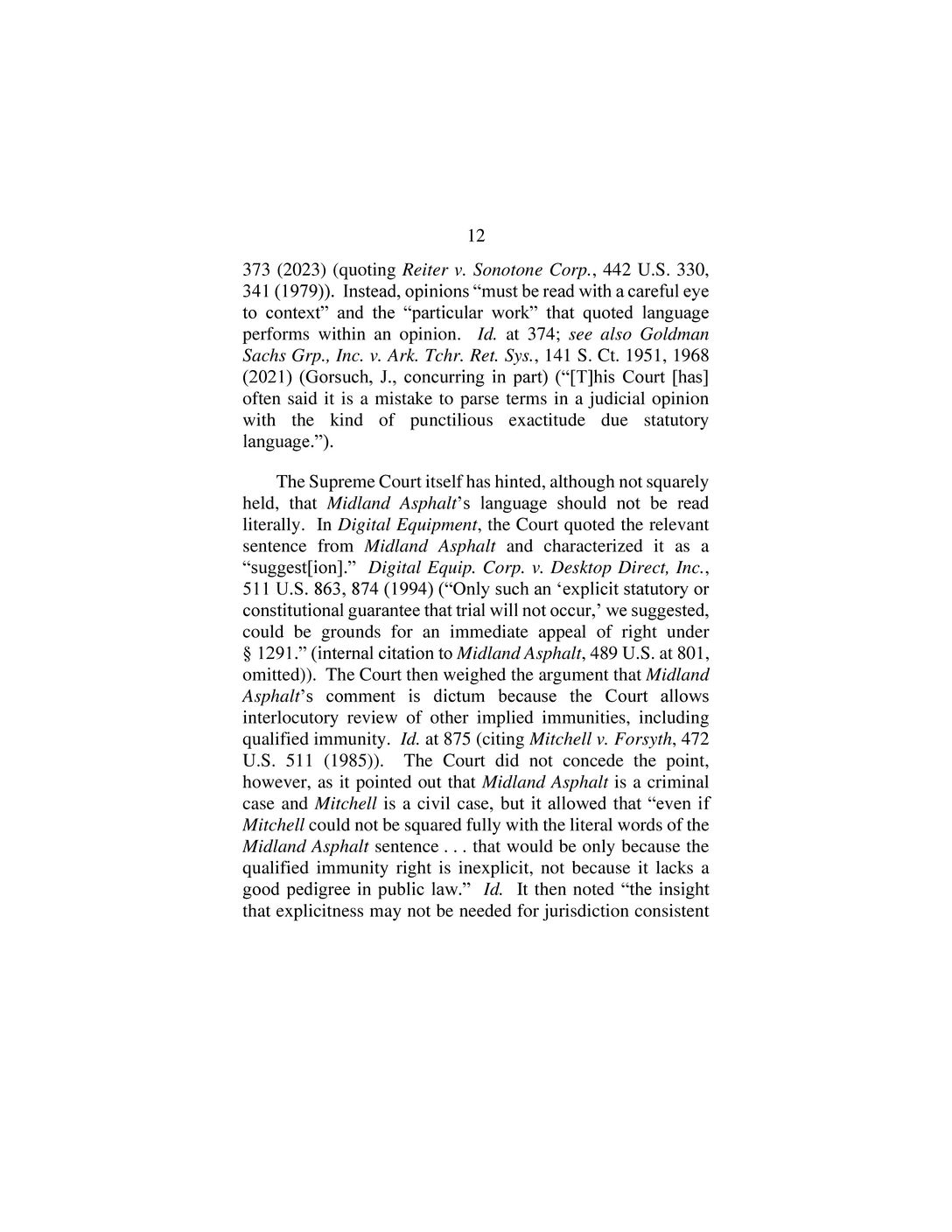
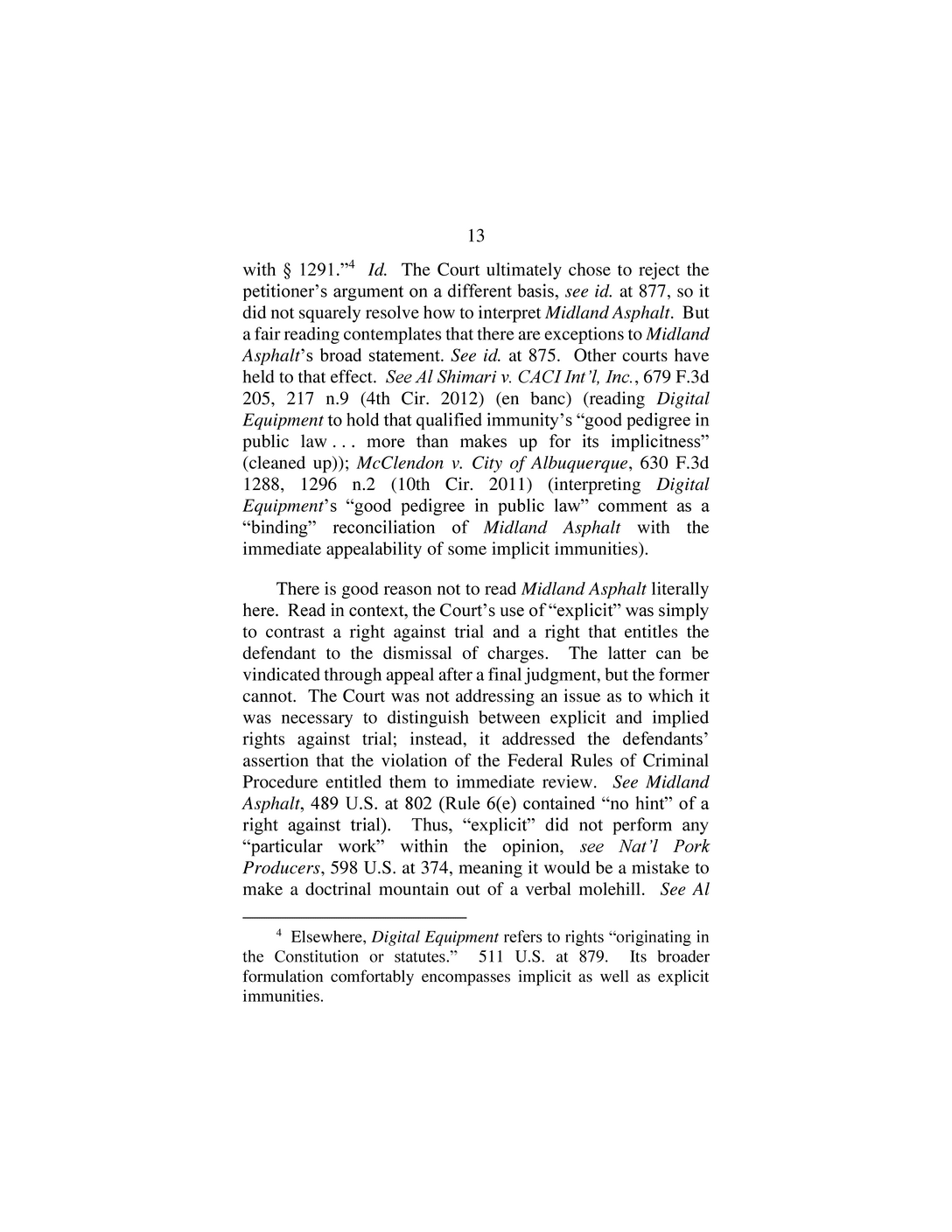
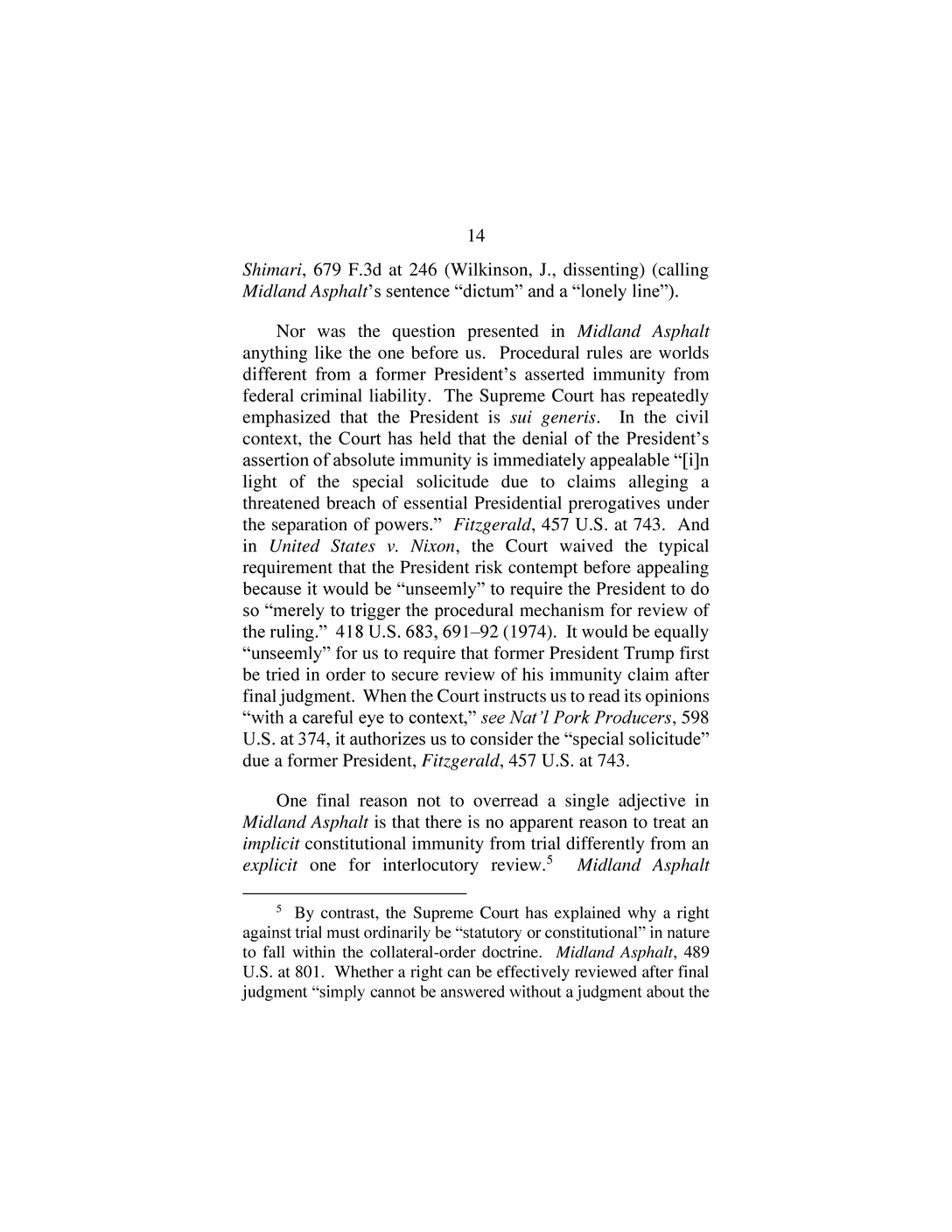
New York Times Analysis
« Previous Next »
Ex-Presidents Can Warrant Exceptions
8
One theme running through the various legal cases involving Mr. Trump is whether former presidents should be treated differently than normal defendants. In this case, the panel says the fact that he is a former president is an additional reason to decide the immunity issue now rather than waiting for him to go to trial.
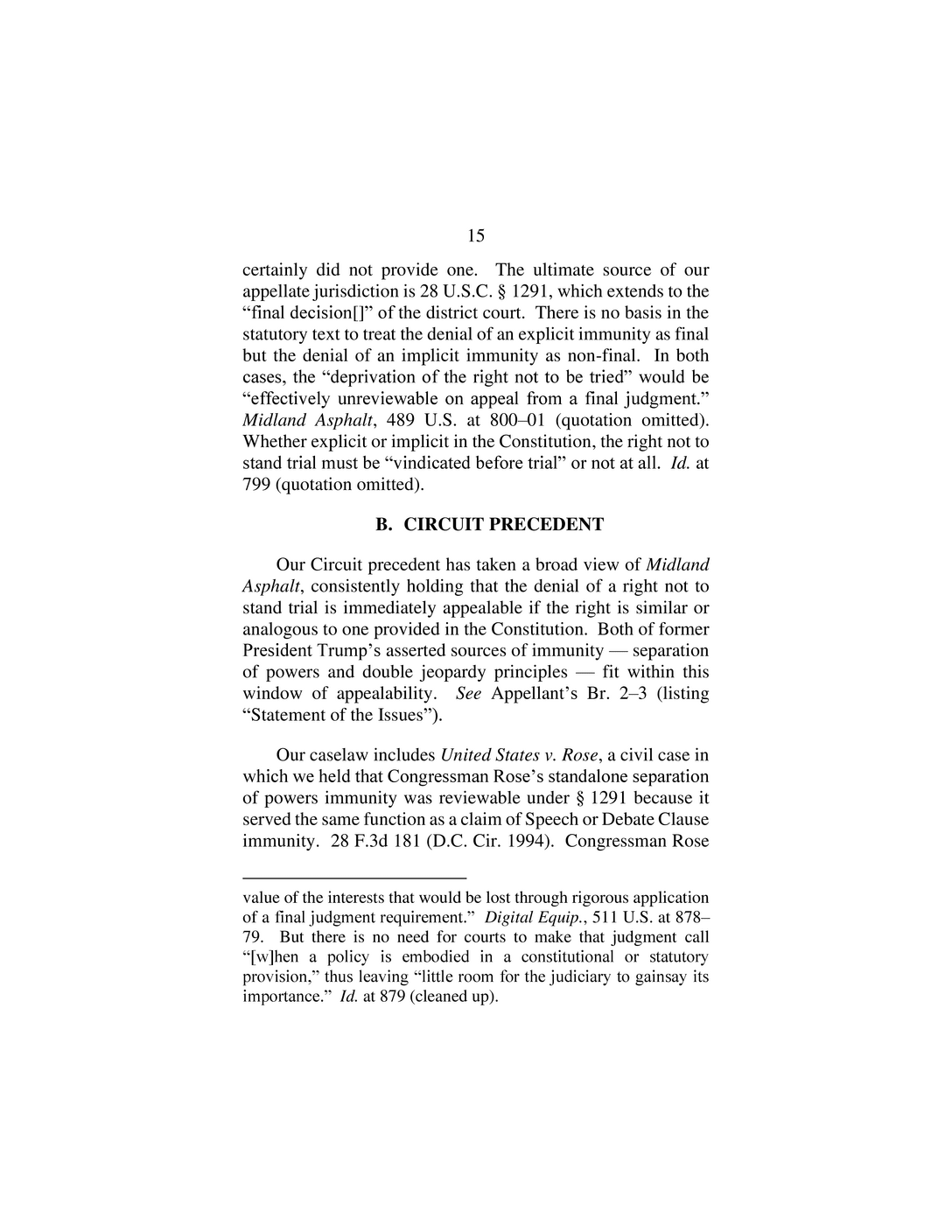
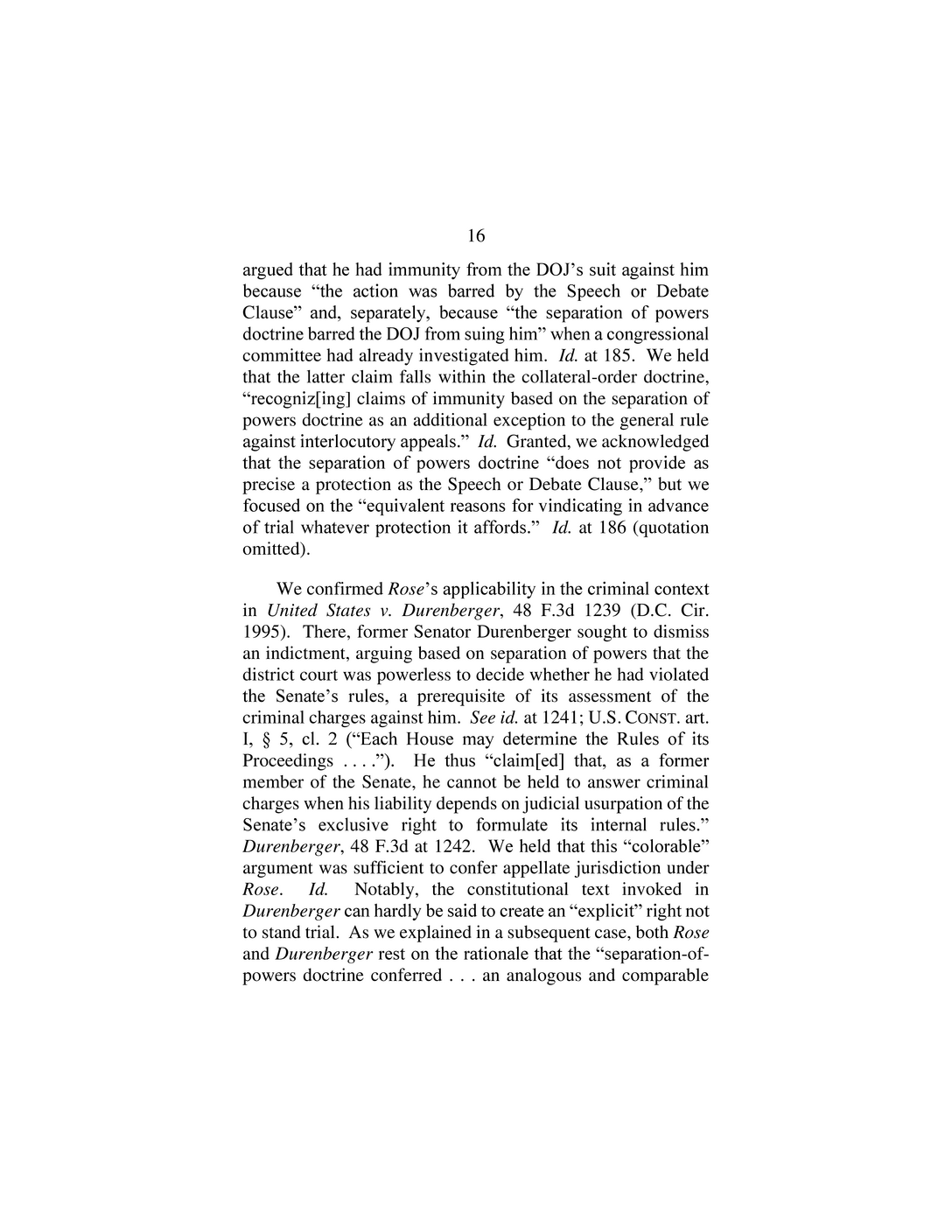
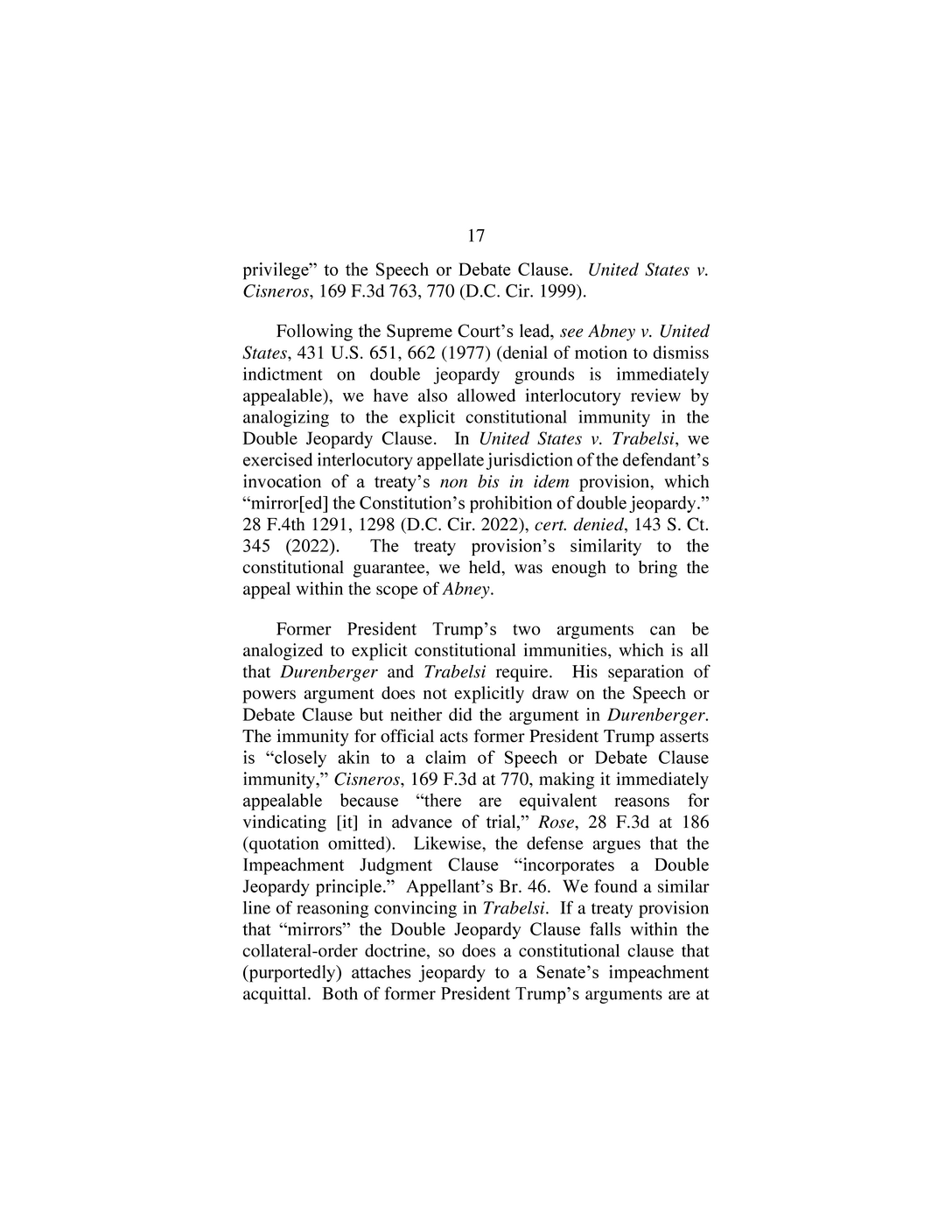
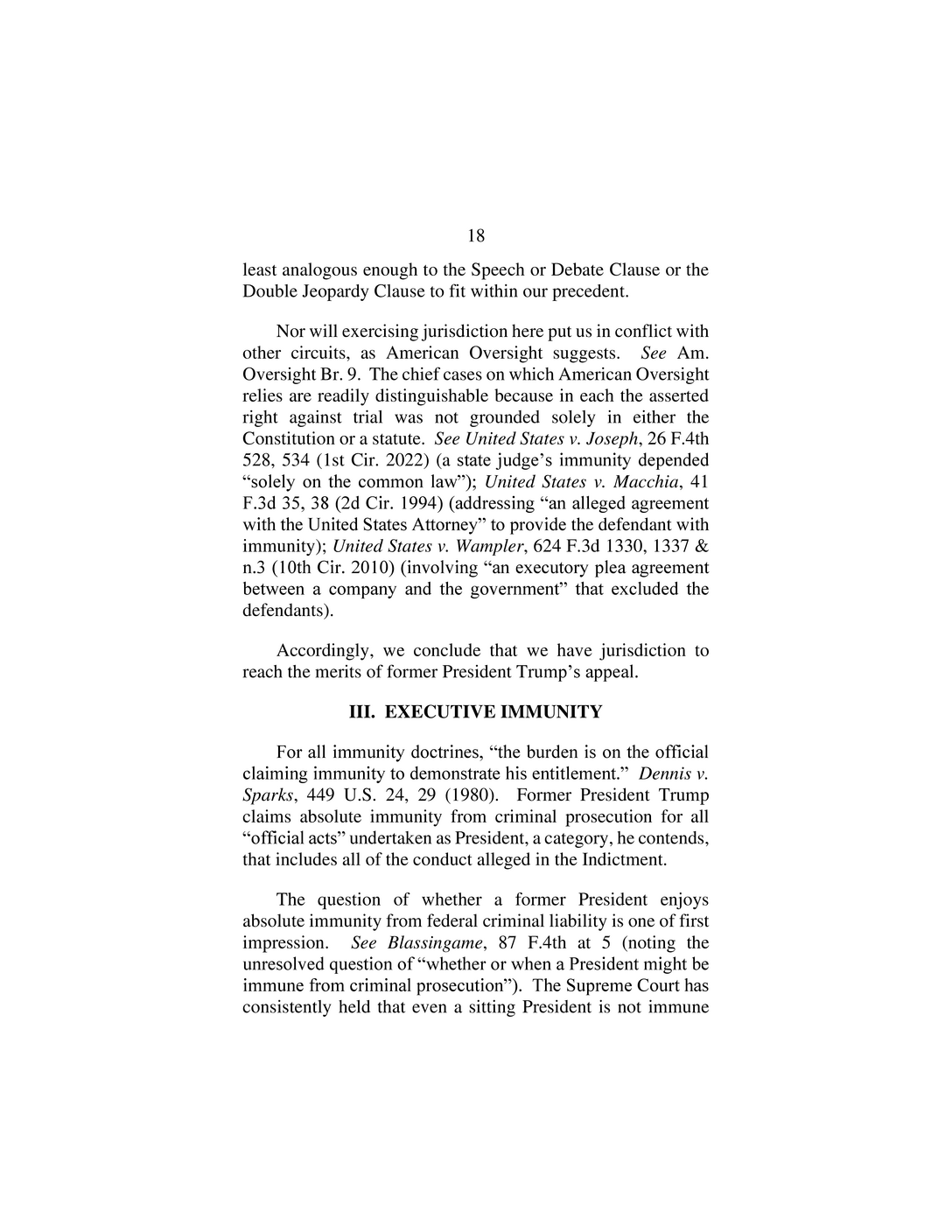
New York Times Analysis
« Previous Next »
Trump’s Position
9
Mr. Trump is claiming that presidents are absolutely immune from criminal prosecution over their official acts and that his efforts to overturn the 2020 election results fall into that category.
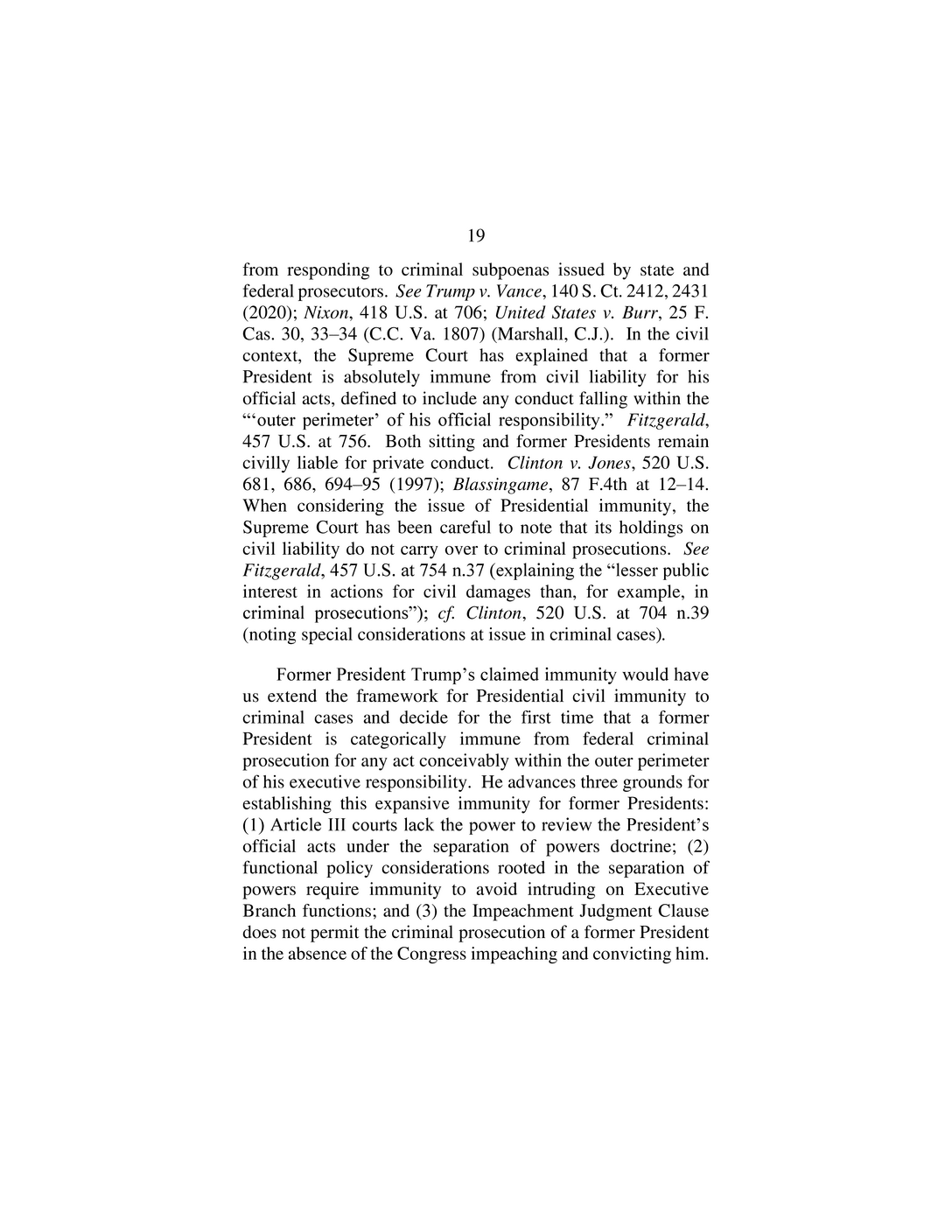
New York Times Analysis
« Previous Next »
A Novel Claim
10
While the Supreme Court has held that presidents are immune from civil lawsuits over their official acts, there is no precedent that says they cannot be criminally charged for official crimes. Before Mr. Trump, no former president was ever charged with a crime, so the judiciary has never had an opportunity to consider this issue until now.
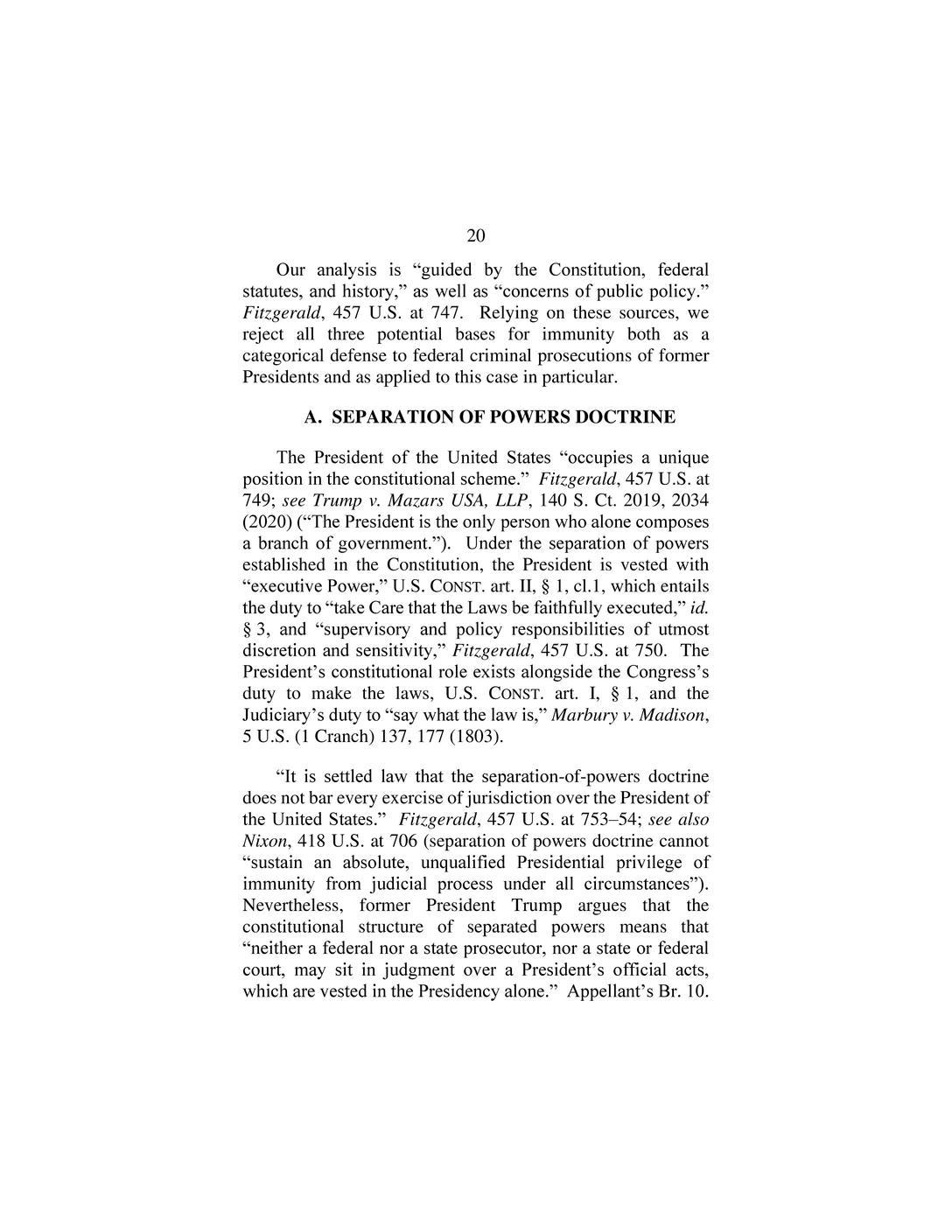
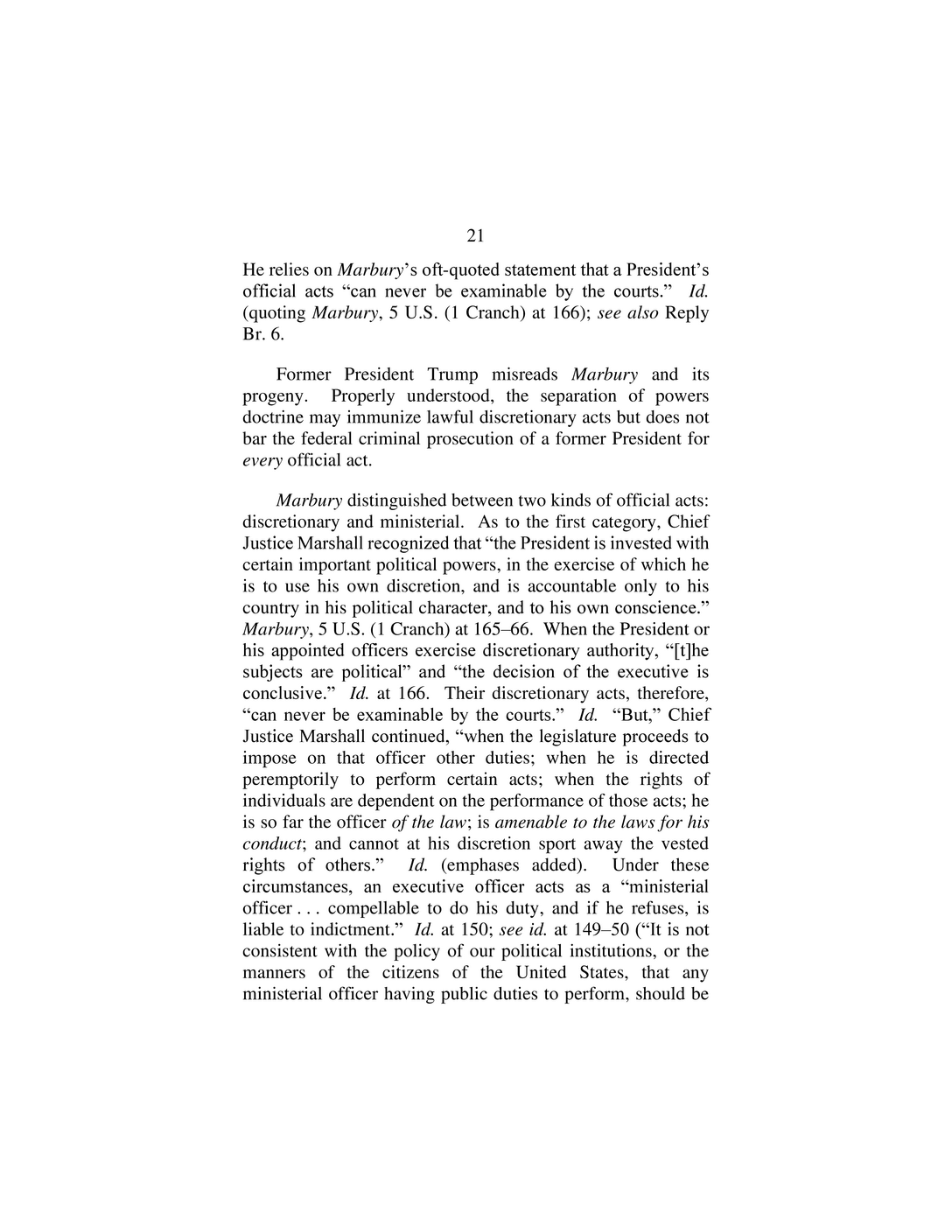
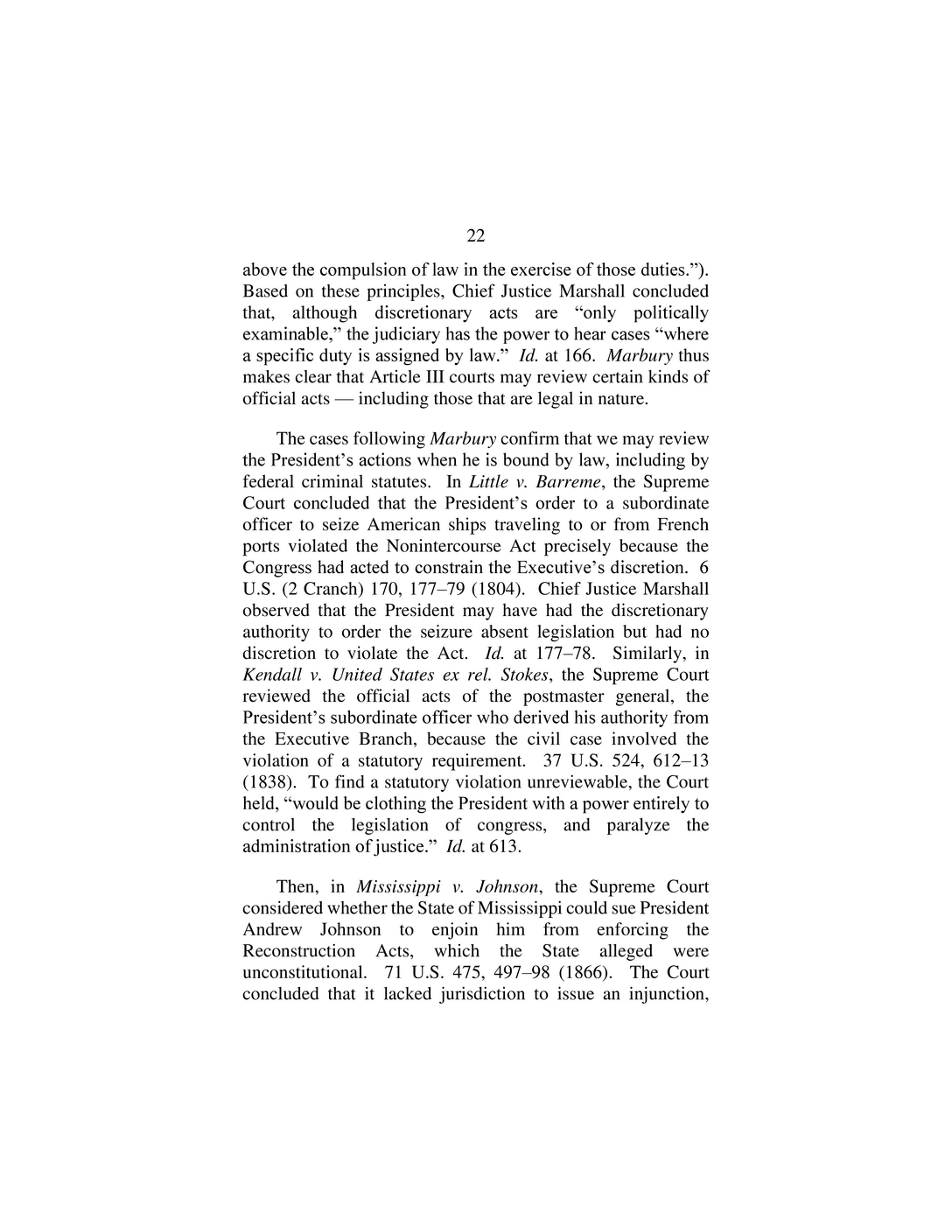
New York Times Analysis
« Previous Next »
Reviewing Whether a President Broke the Law
11
The panel says that while courts may not be able to review how a president exercised discretionary executive authority, they can review whether he violated federal criminal statutes that he is bound to obey.
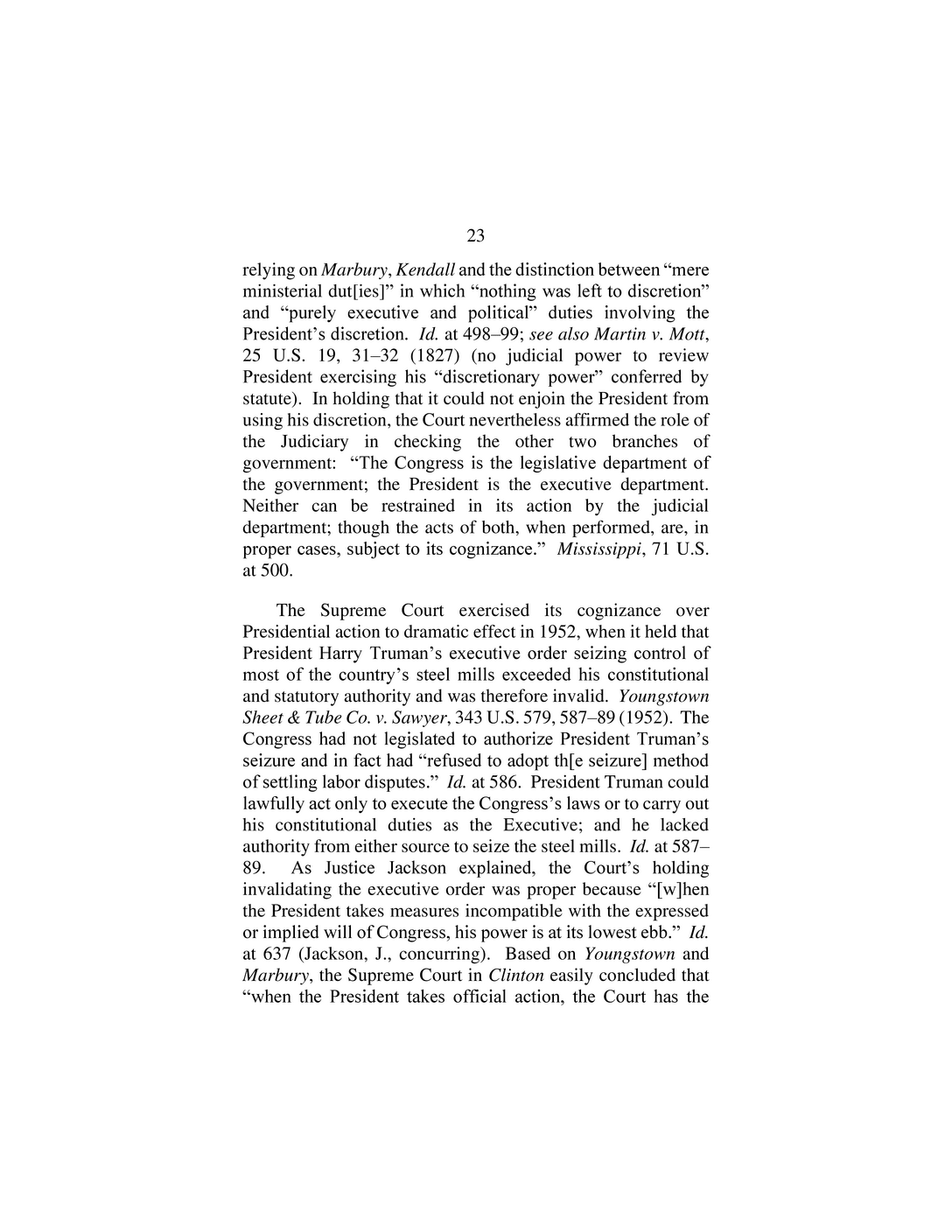
New York Times Analysis
« Previous Next »
A Famous Precedent
12
The panel invokes one of the most famous precedents in the annals of law on executive power: In 1952, the Supreme Court struck down as illegal President Truman’s attempt to seize the nation’s steel mills to maintain production during the Korean War. Questions of presidential power are often discussed in the context of Justice Robert Jackson’s concurrence, which analyzed what a president could do when acting in alignment with federal statutes, in the absence of statutes or in conflict with statutes.
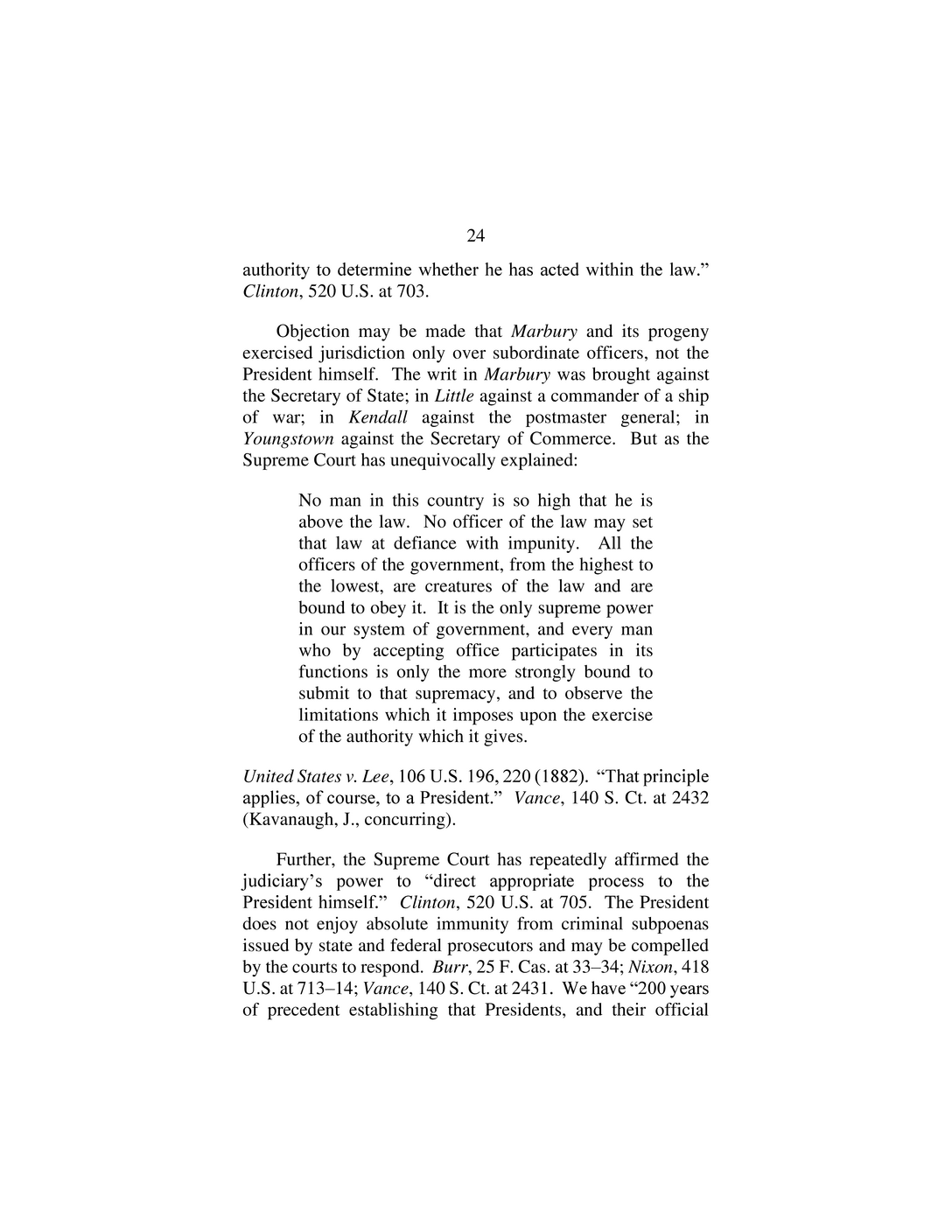
New York Times Analysis
« Previous Next »
Criminal Subpoenas
13
The panel notes precedents like the Nixon Watergate tapes case showing that presidents must obey subpoenas in criminal investigations.
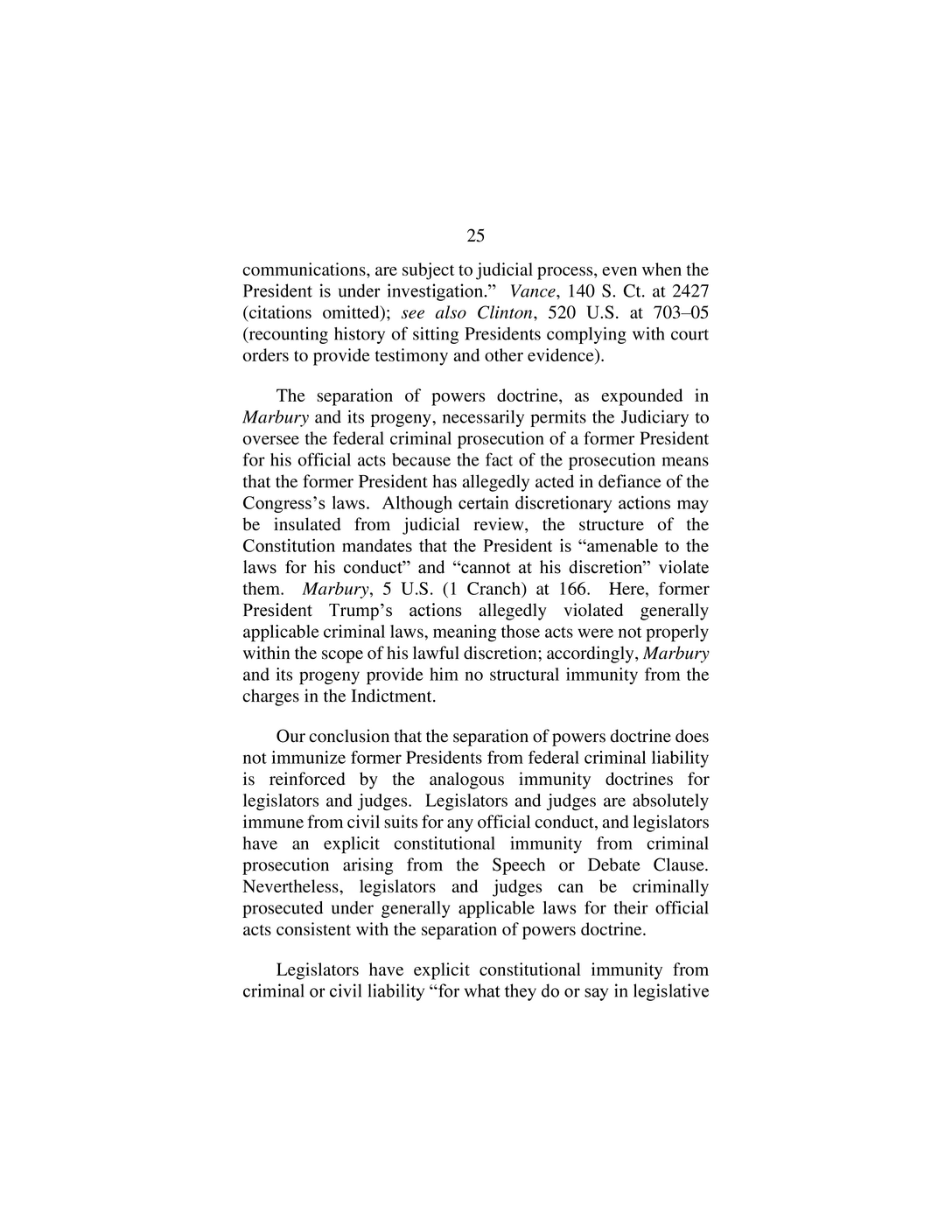
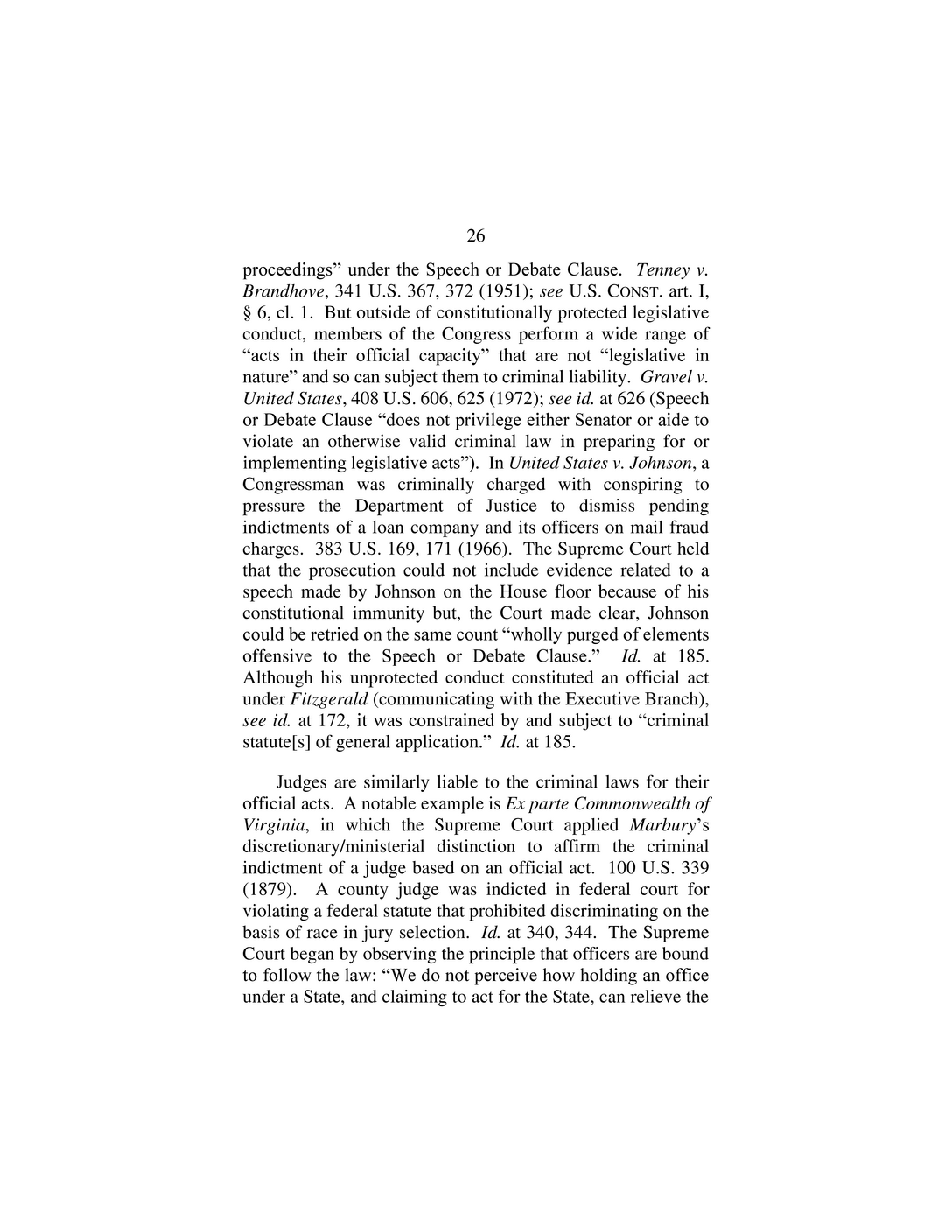
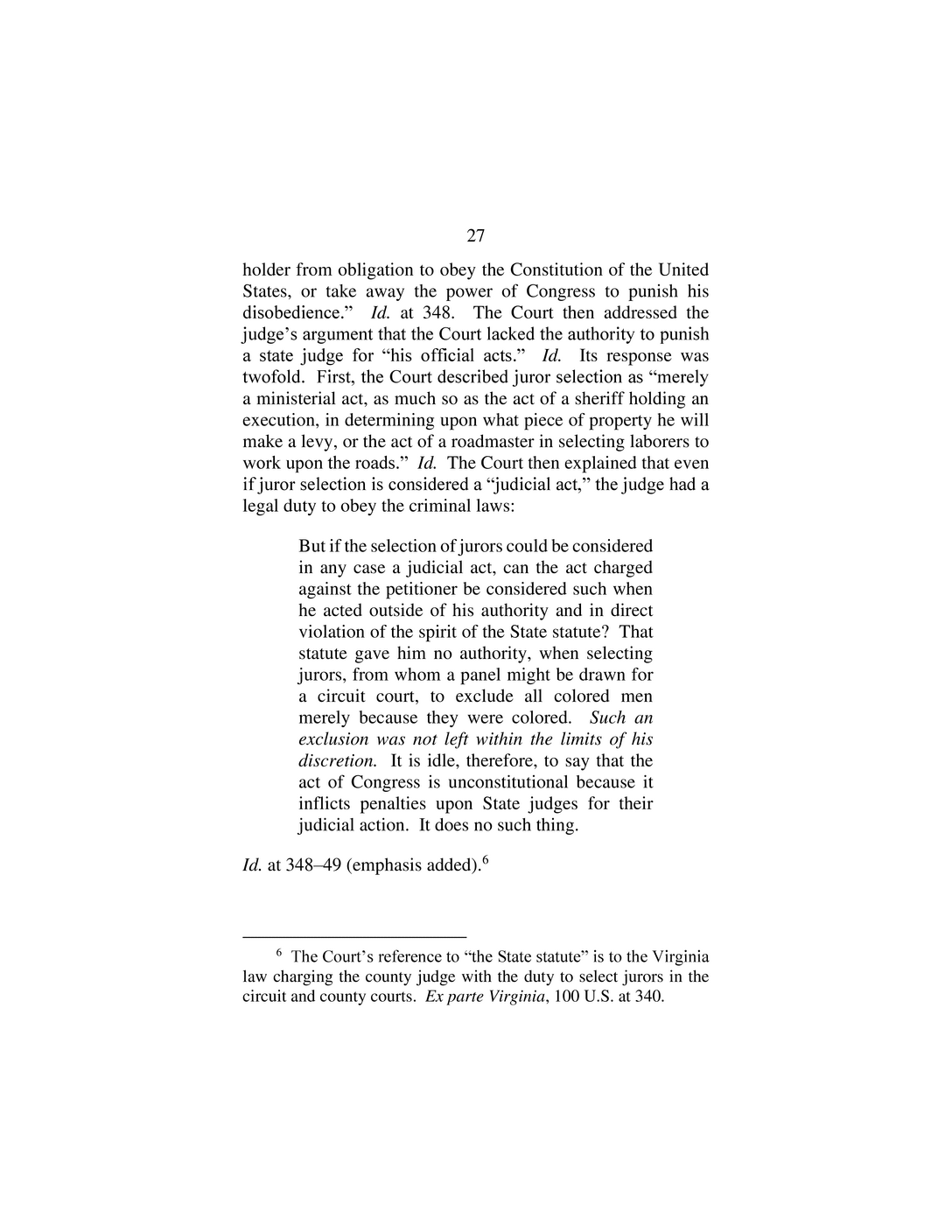
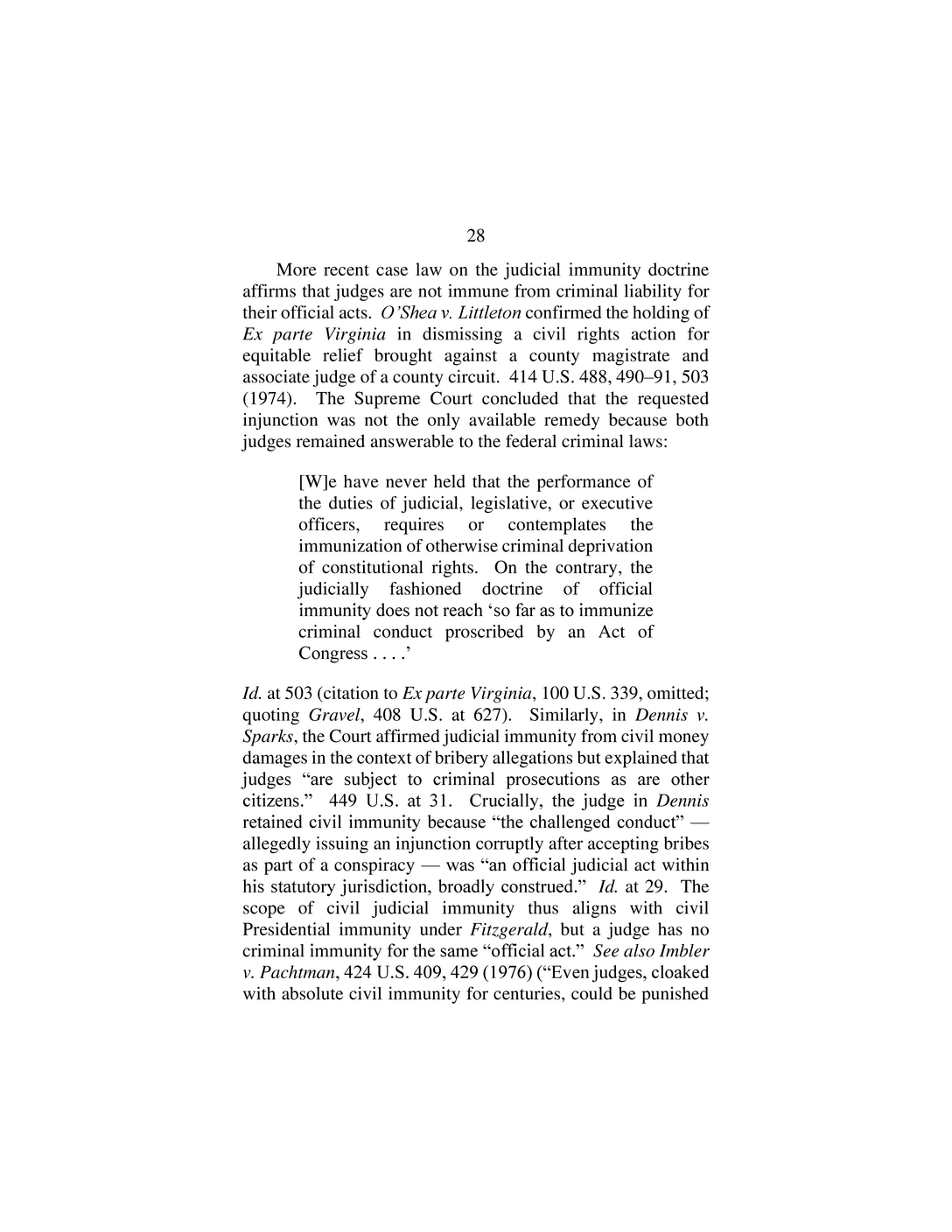
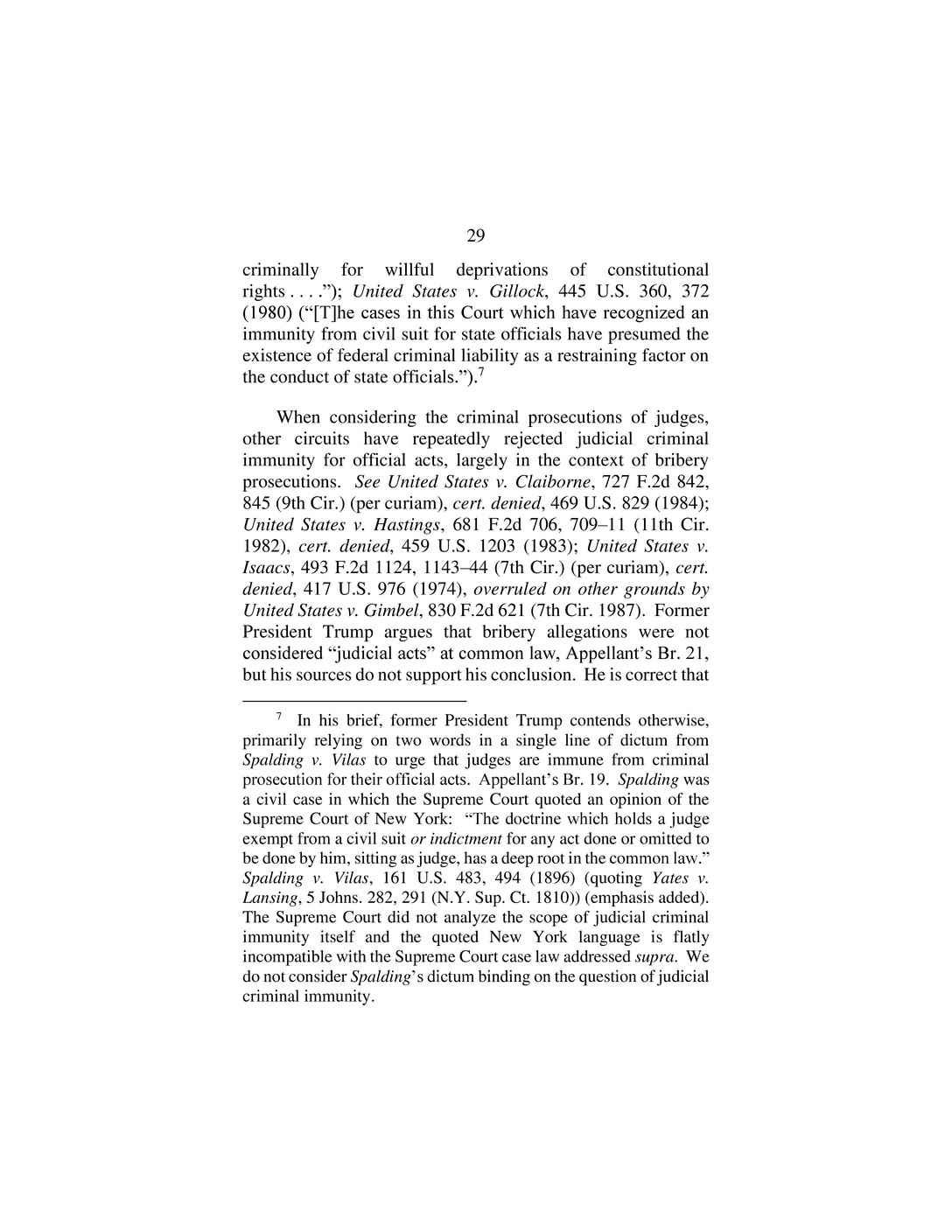
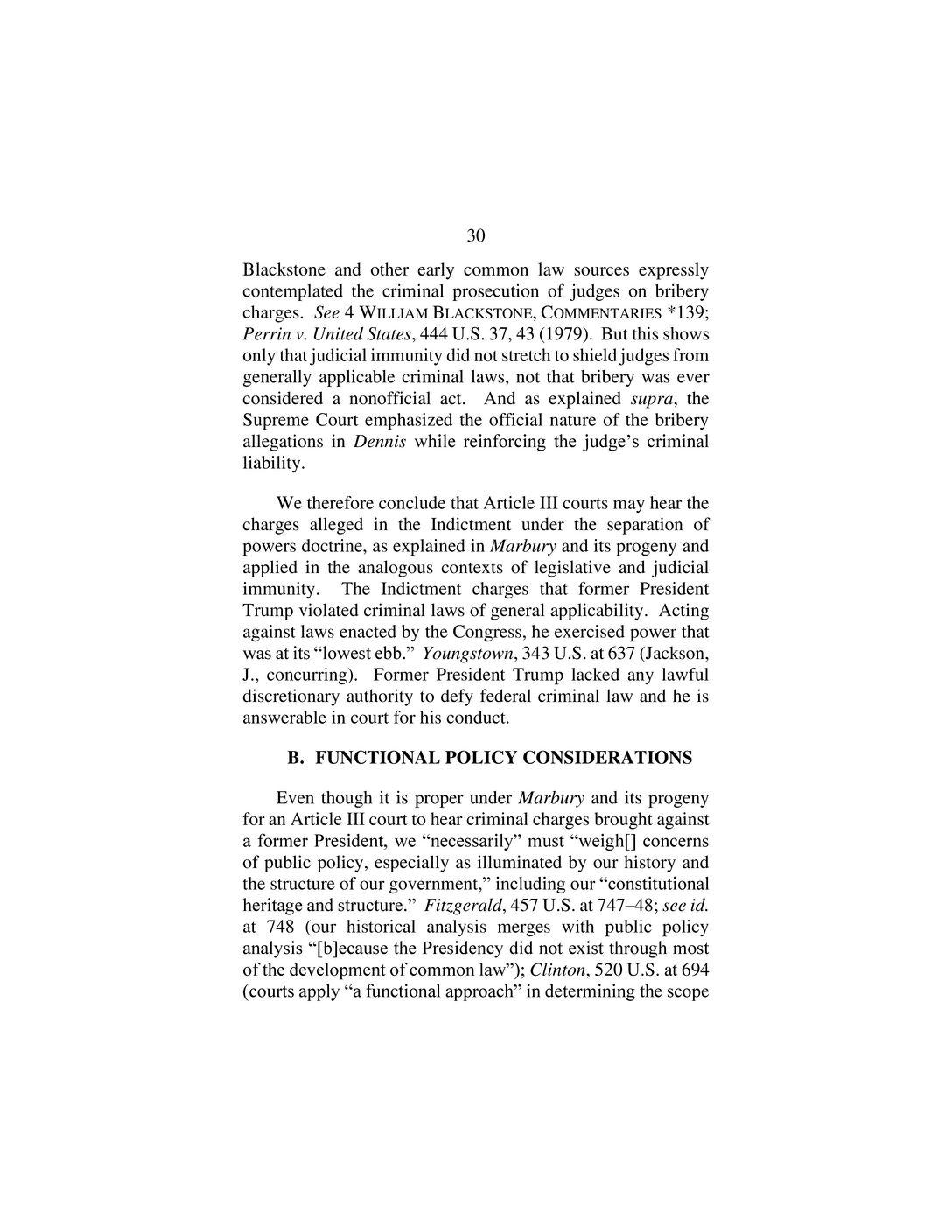
New York Times Analysis
« Previous Next »
No Power to Defy Criminal Law
14
The panel concludes that courts have jurisdiction to to hear the charges — rather than the president being immune: “Former President Trump lacked any lawful discretionary authority to defy federal criminal law and he is answerable in court for his conduct.”
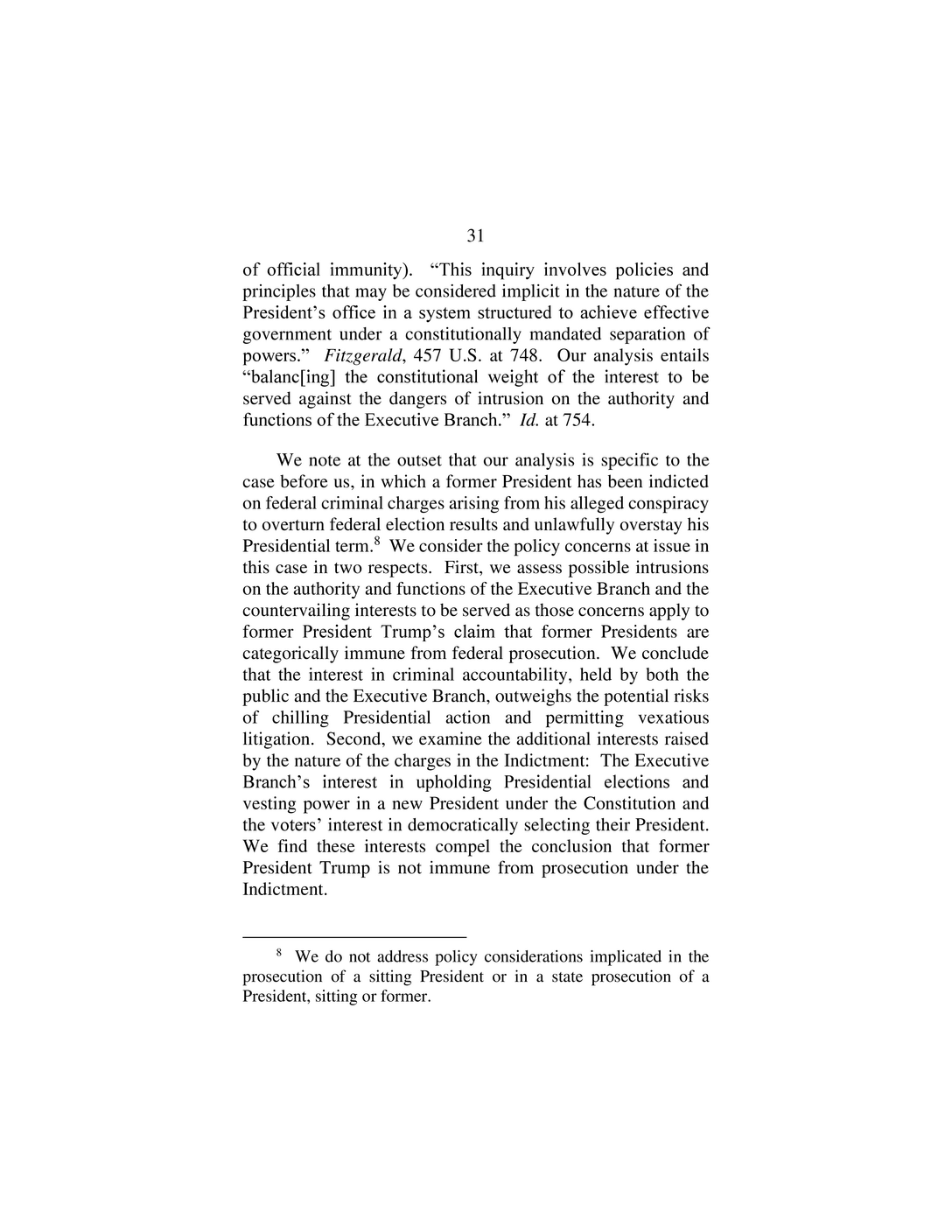
New York Times Analysis
« Previous Next »
Balancing Interests
15
The public and government interest in holding people accountable over violations of criminal law outweigh fears that presidents will be chilled in exercising their constitutional authority because they are concerned about future prosecution.
Issues for Another Day
16
The panel stresses that this ruling does not address whether a sitting president can be prosecuted, nor whether a state court can prosecute a sitting or former president. Mr. Trump, of course, is also facing a state trial in Georgia over his attempts to subvert the election.
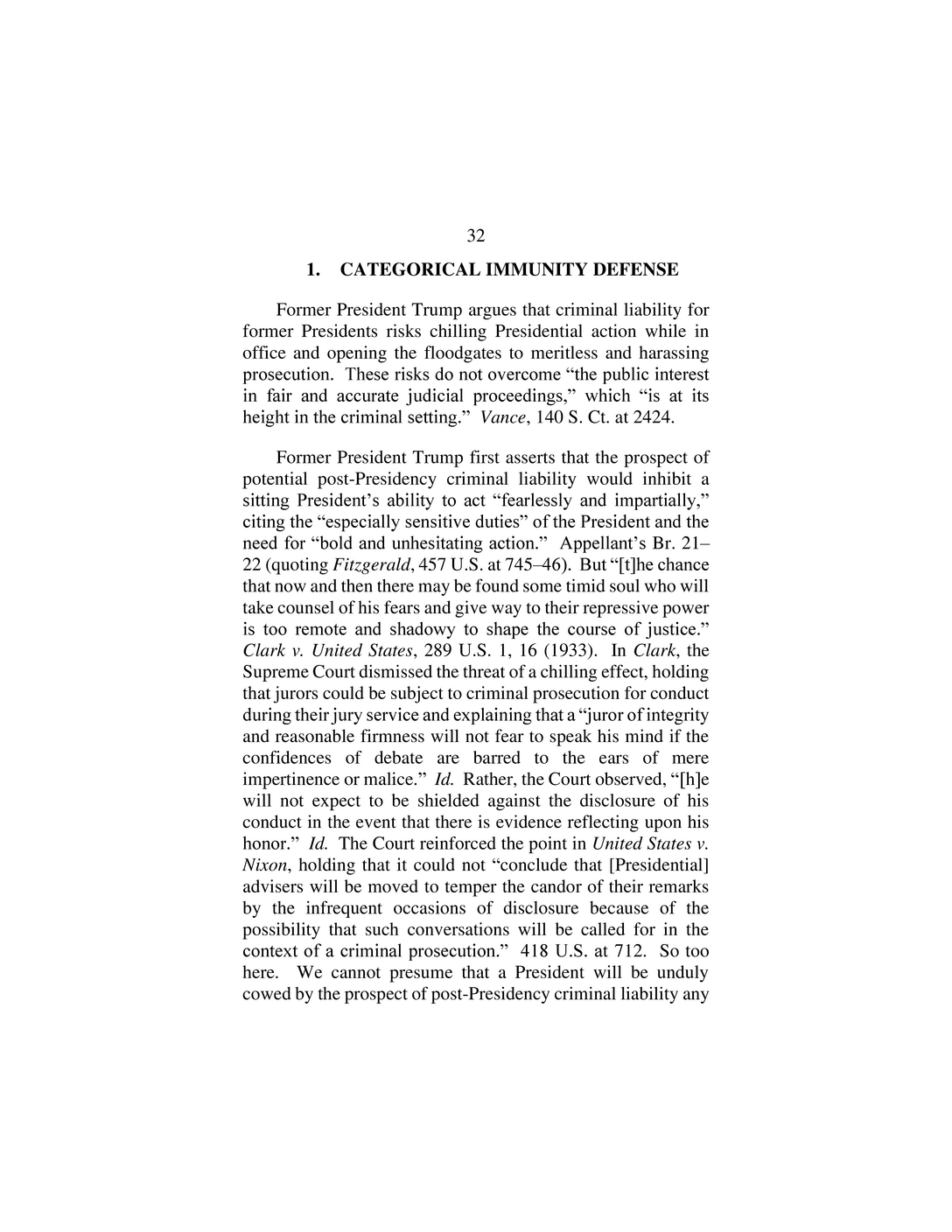
New York Times Analysis
« Previous Next »
Presidents Are Unlikely to Be Timid Souls
17
Analogizing the case to other situations, like jurors, the panel concludes that the possibility of criminal prosecution should not be expected to frighten presidents out of doing their jobs.
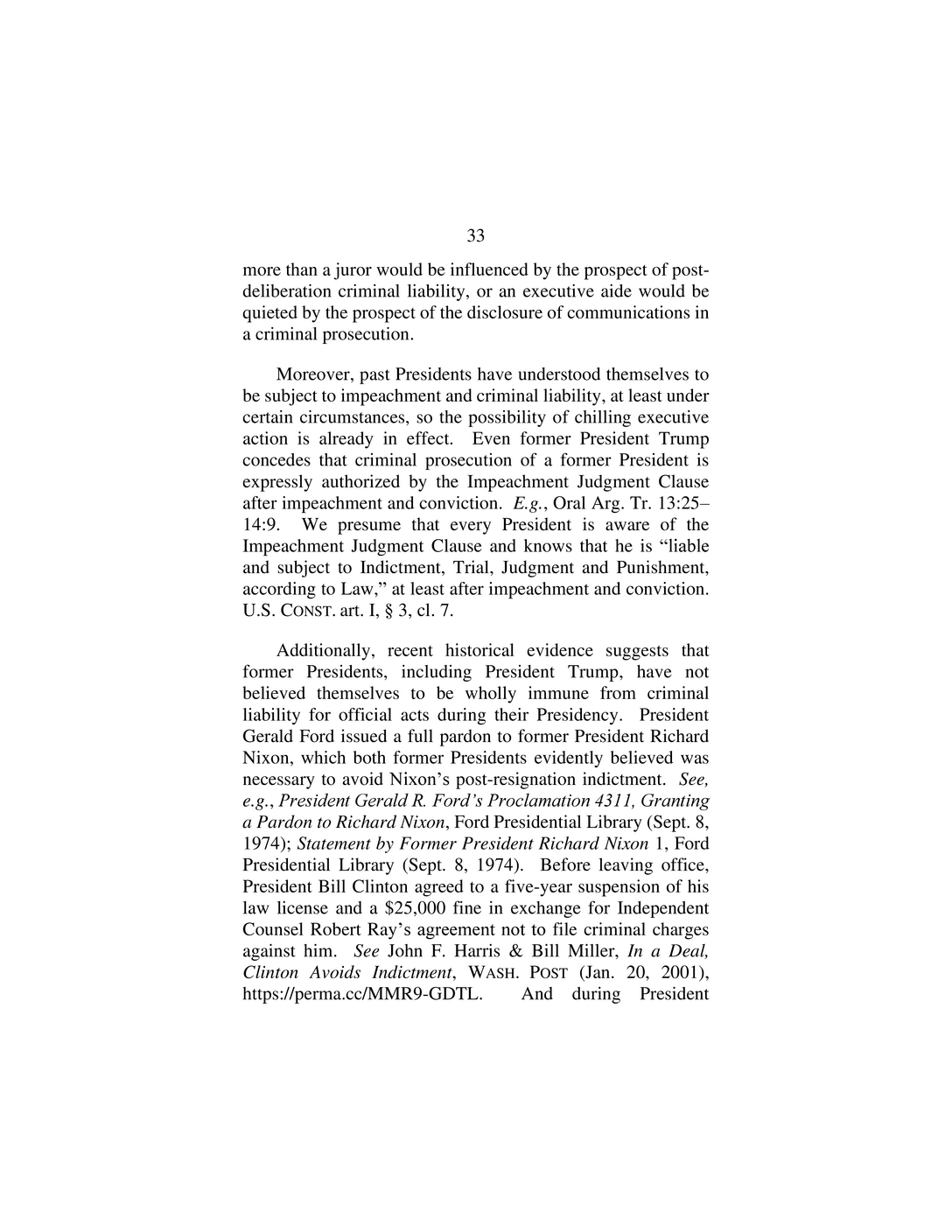
New York Times Analysis
« Previous Next »
Nixon’s Pardon
18
If presidents are immune from prosecution, then Gerald Ford’s pardon of Nixon after Watergate — and Nixon’s acceptance of that pardon — was unnecessary. The panel is making the point that other presidents have understood that they are not absolutely immune.
The Possibility of Prosecution
19
Mr. Trump’s legal team had argued that presidents are not immune from prosecution for official actions if — but only if — they had first been impeached and convicted over those same actions. While rejecting impeachment conviction as a necessary precondition, the panel notes that this acknowledgment means that presidents are already aware they could later be prosecuted for any official crimes, so there would be some chilling effect regardless.
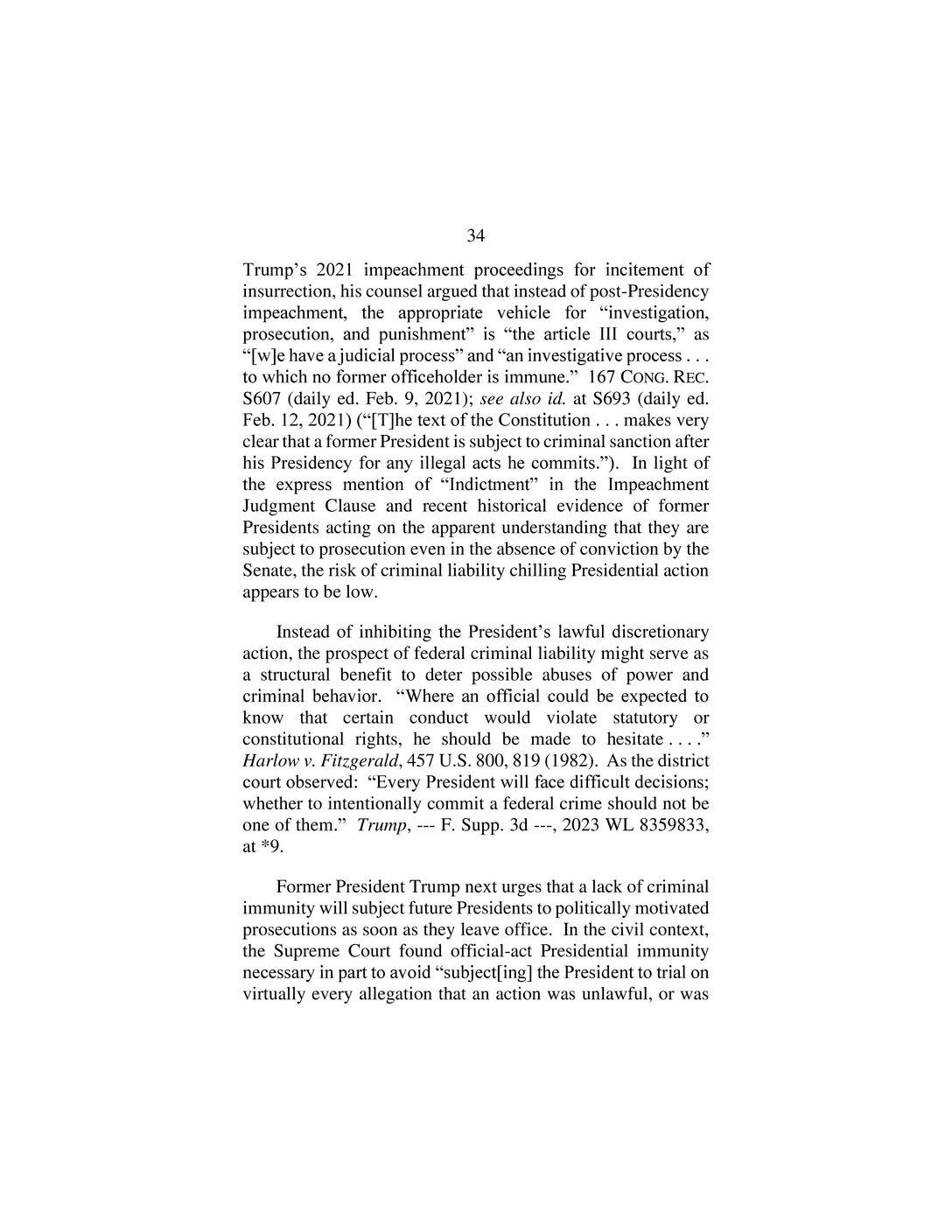
New York Times Analysis
« Previous Next »
Chilled From Breaking the Law
20
The panel says a lack of immunity is a good thing.
Bait and Switch
21
The panel notes that in his impeachment trial, Mr. Trump argued through his lawyers that he could not be prosecuted by the Senate because he was no longer president while assuring lawmakers that the criminal justice system remained available as a potential way to hold him accountable. Here is an article about that issue.
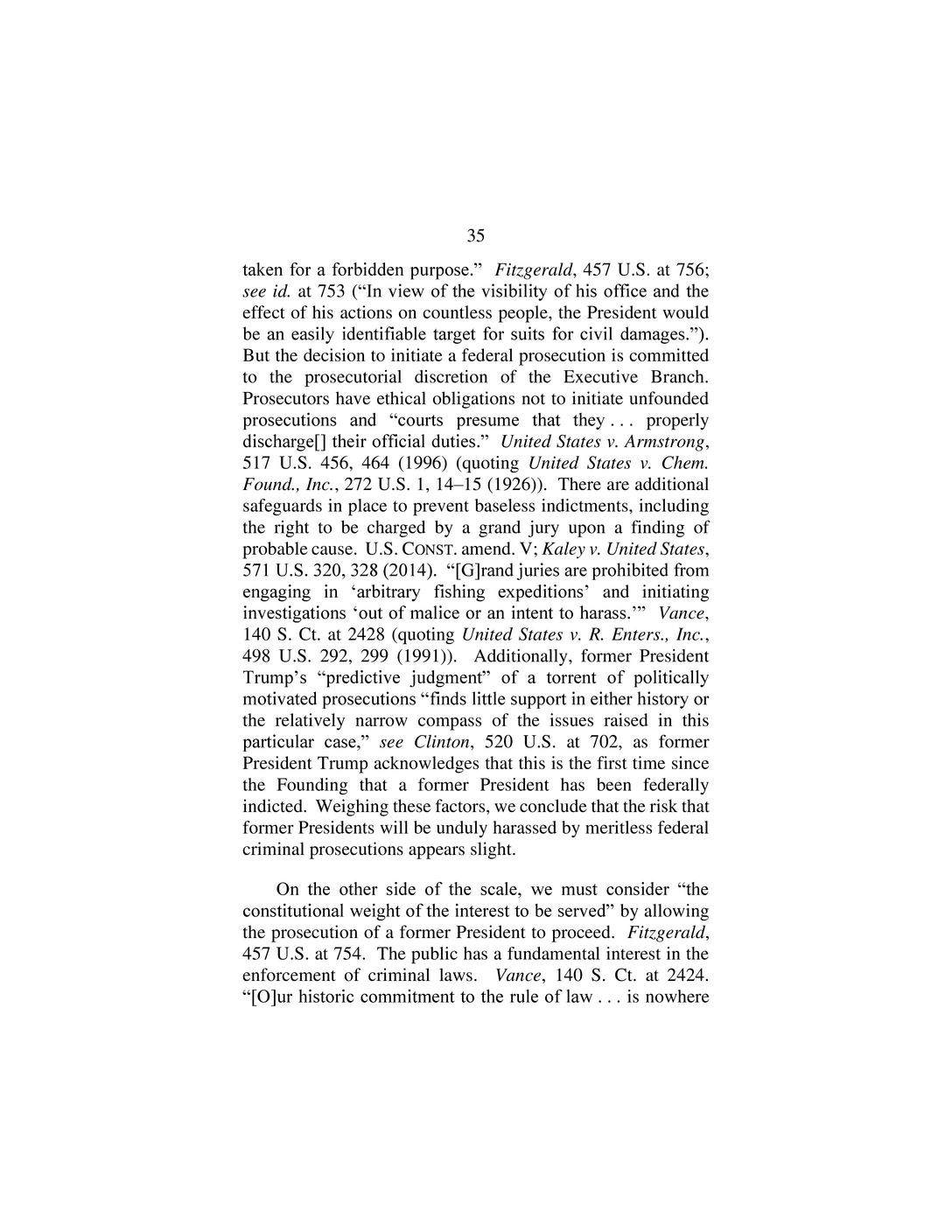
New York Times Analysis
« Previous Next »
Prospect of Routine Harassment
22
While the Supreme Court was worried that allowing presidents to be sued for their official actions would result in a deluge — countless people affected by countless actions could bring suits — there are far greater limitations on who can bring a criminal case and under what circumstances.
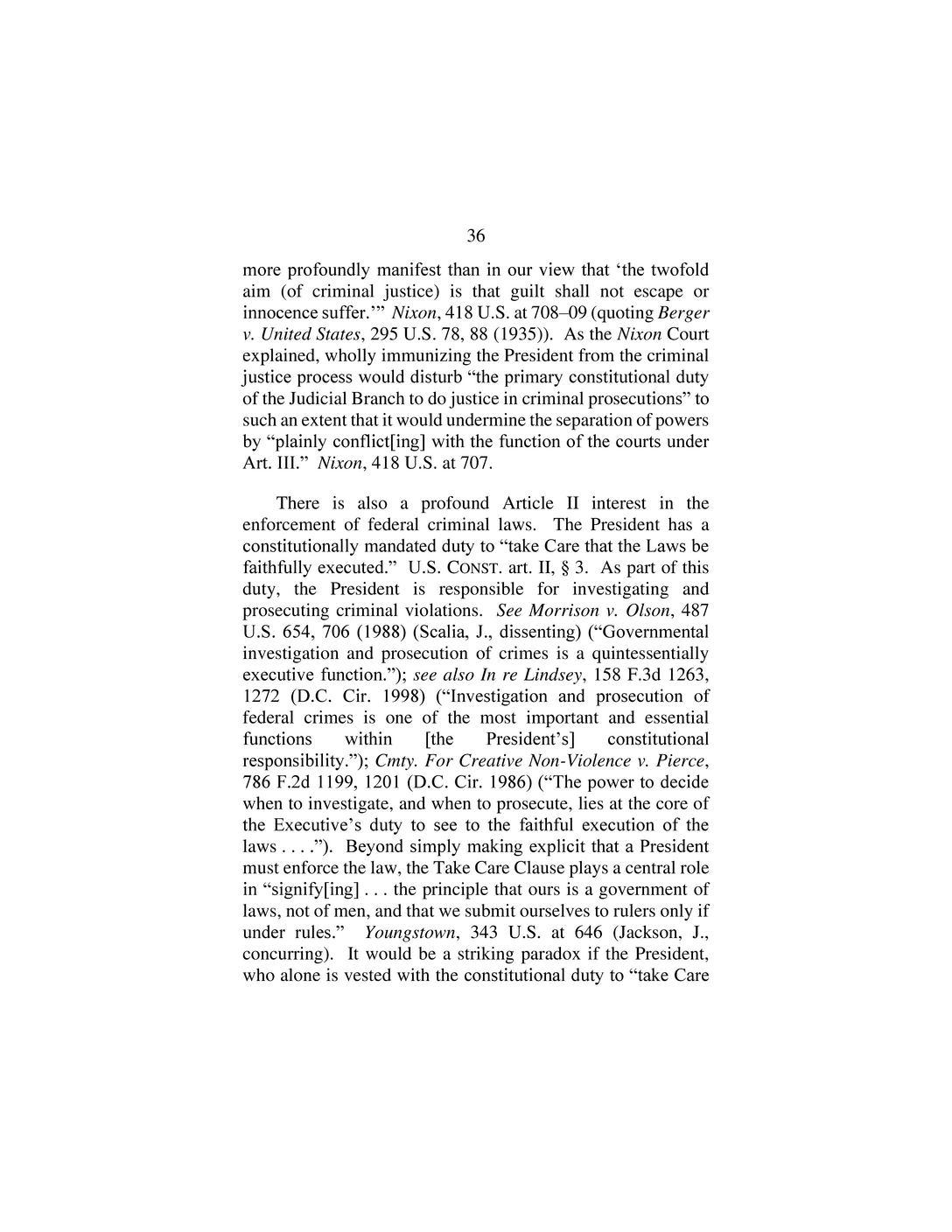
New York Times Analysis
« Previous Next »
Article II Cuts Both Ways
23
Presidents may have an interest in being able to act free from the fear of later prosecution, but presidents also have a constitutionally mandated interest in seeing that the rule of law is upheld.
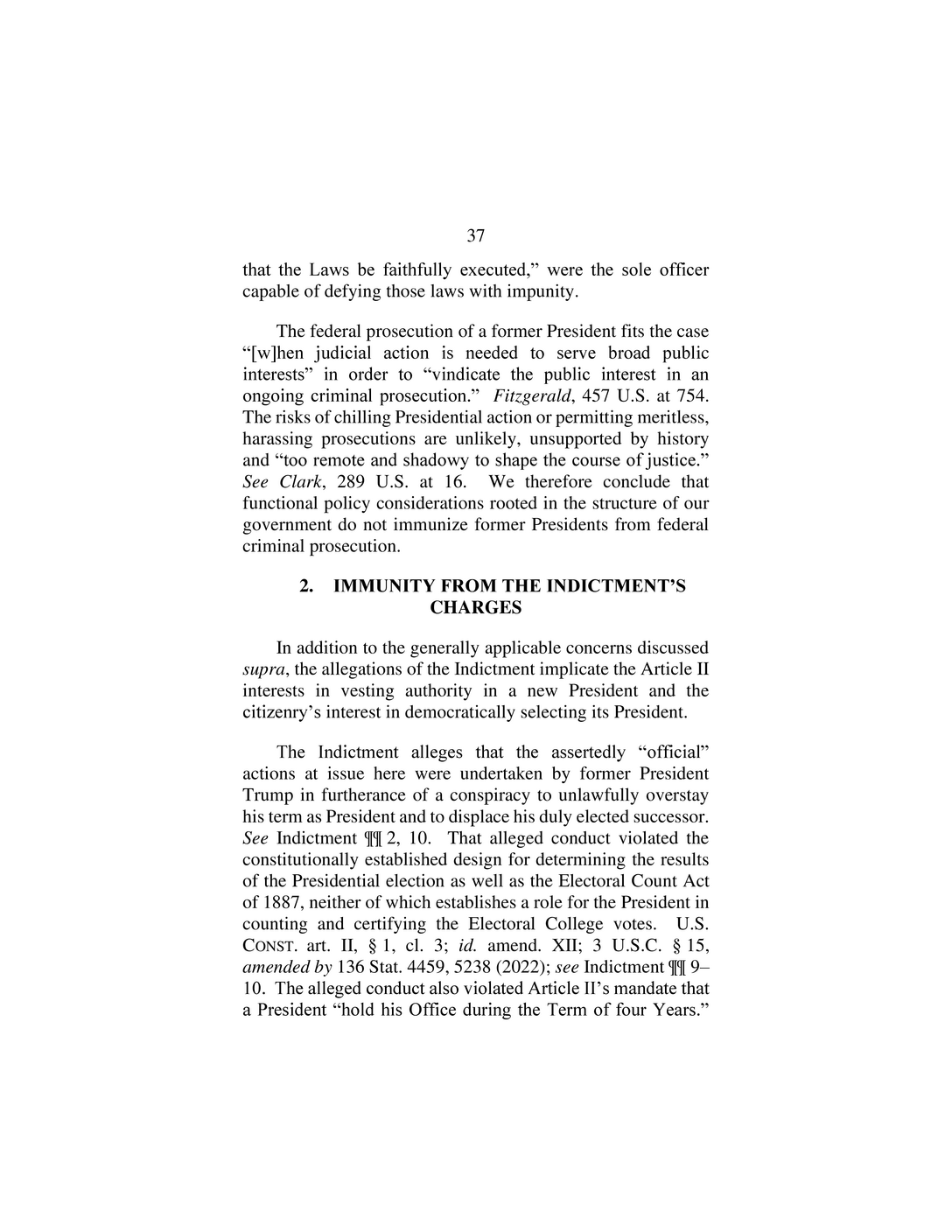
New York Times Analysis
« Previous Next »
Counting of Electoral College Votes
24
Mr. Trump has said his actions in seeking to overturn the election results were official, rather than the private actions of a candidate for office. The panel notes that presidents have no constitutionally prescribed role in the Electoral College system.
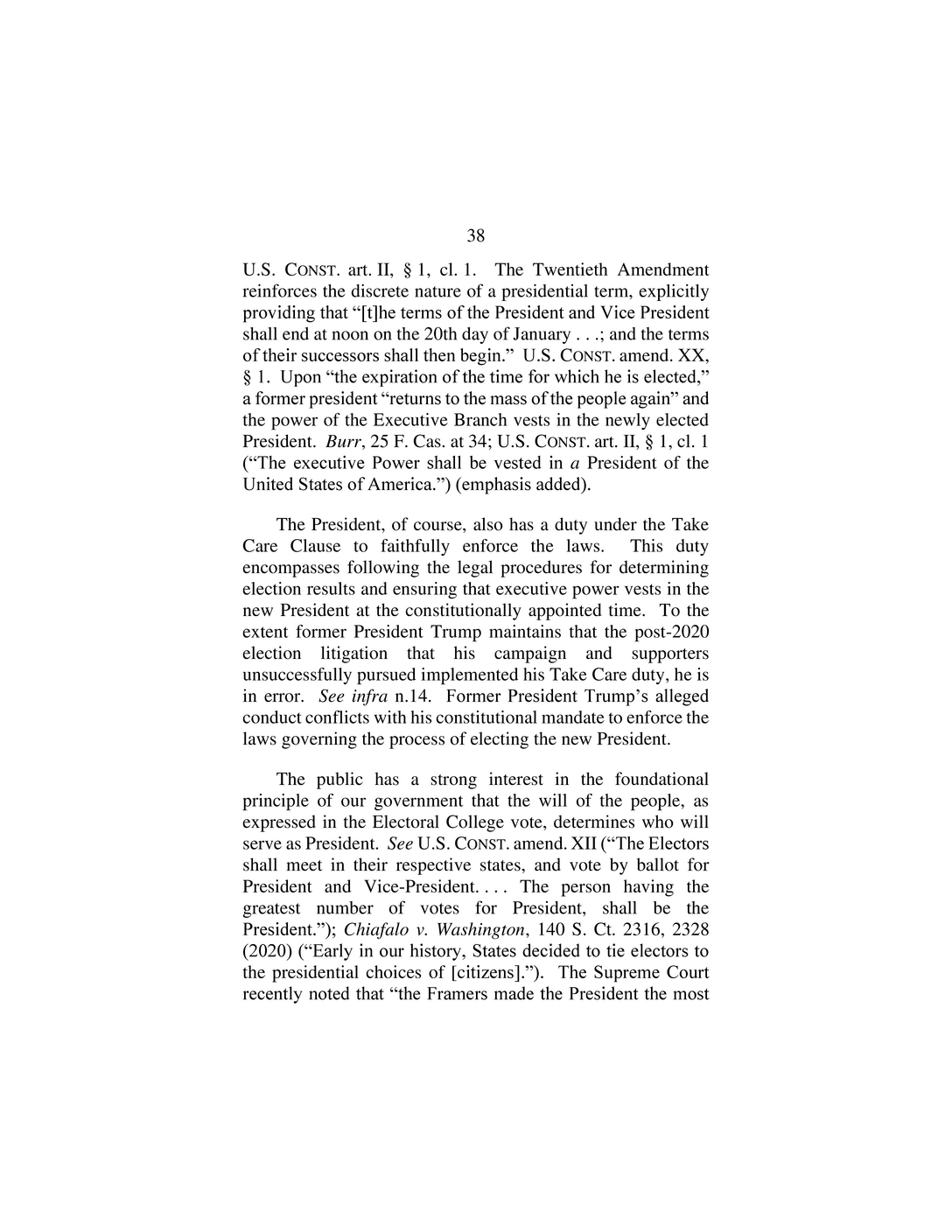
New York Times Analysis
« Previous Next »
Trump’s Official Duties
25
Mr. Trump has argued that his actions were official because he had a duty to uphold election law. The panel says his alleged actions conflicted with that duty.
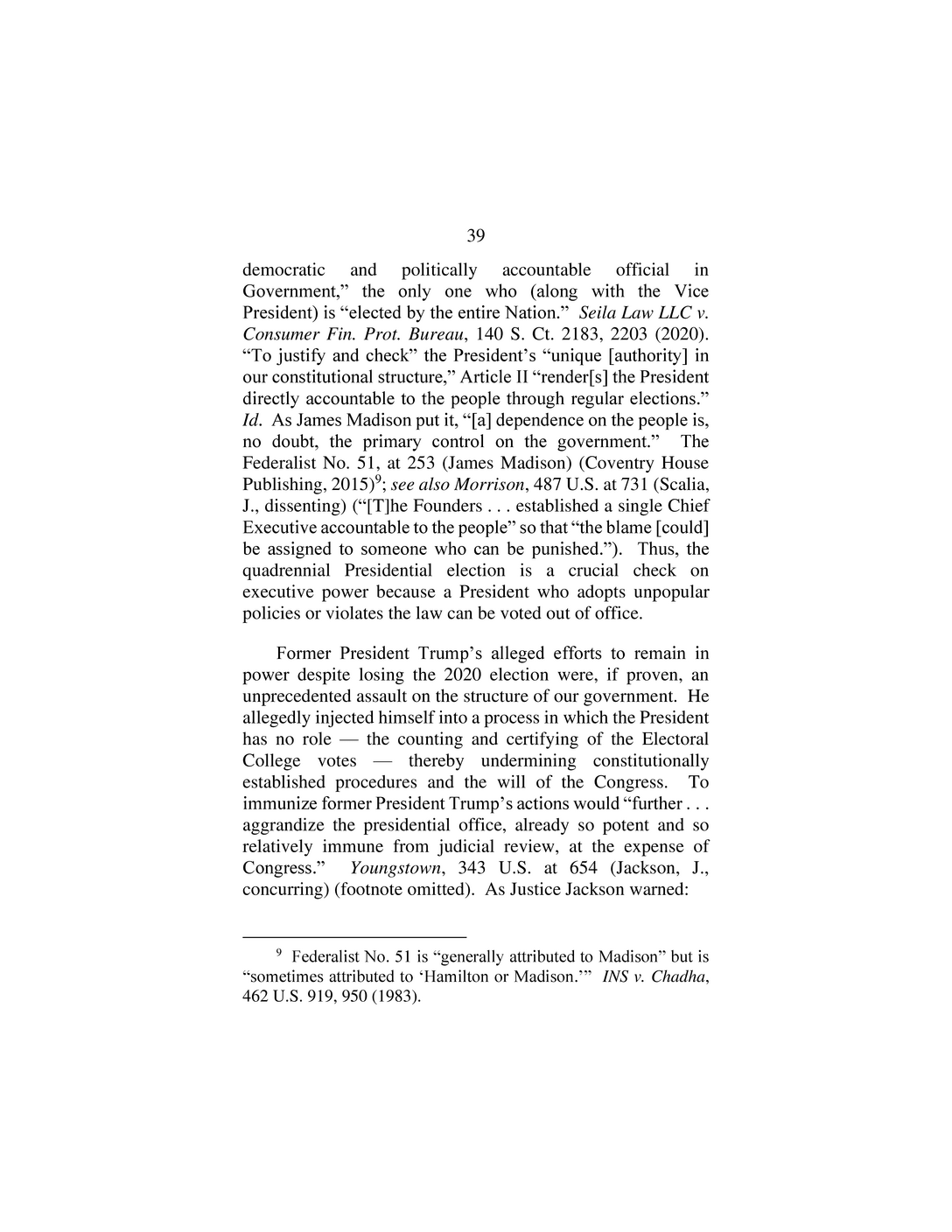
New York Times Analysis
« Previous Next »
Harsh Words
26
The panel’s description of Mr. Trump’s actions leading up to Jan. 6 is forceful.
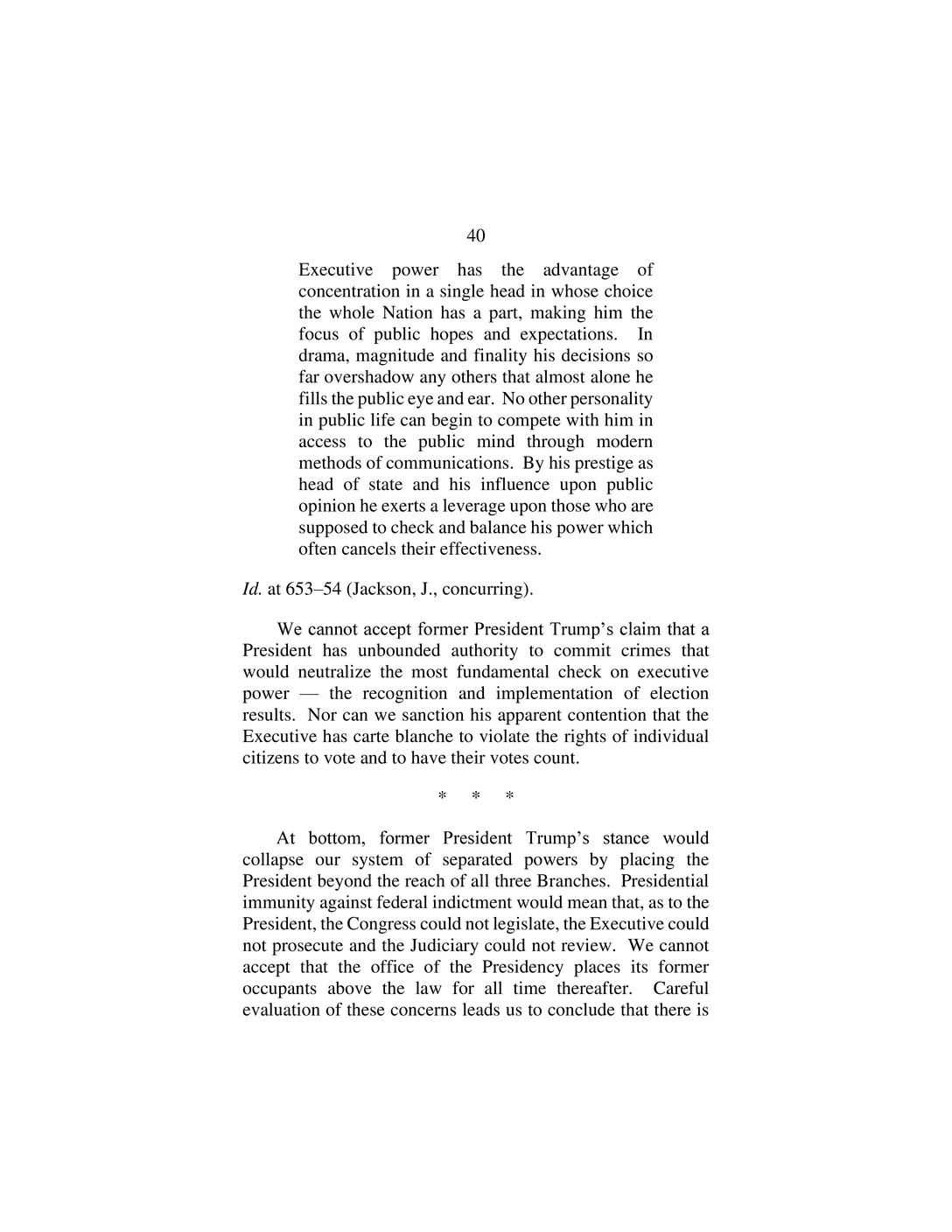
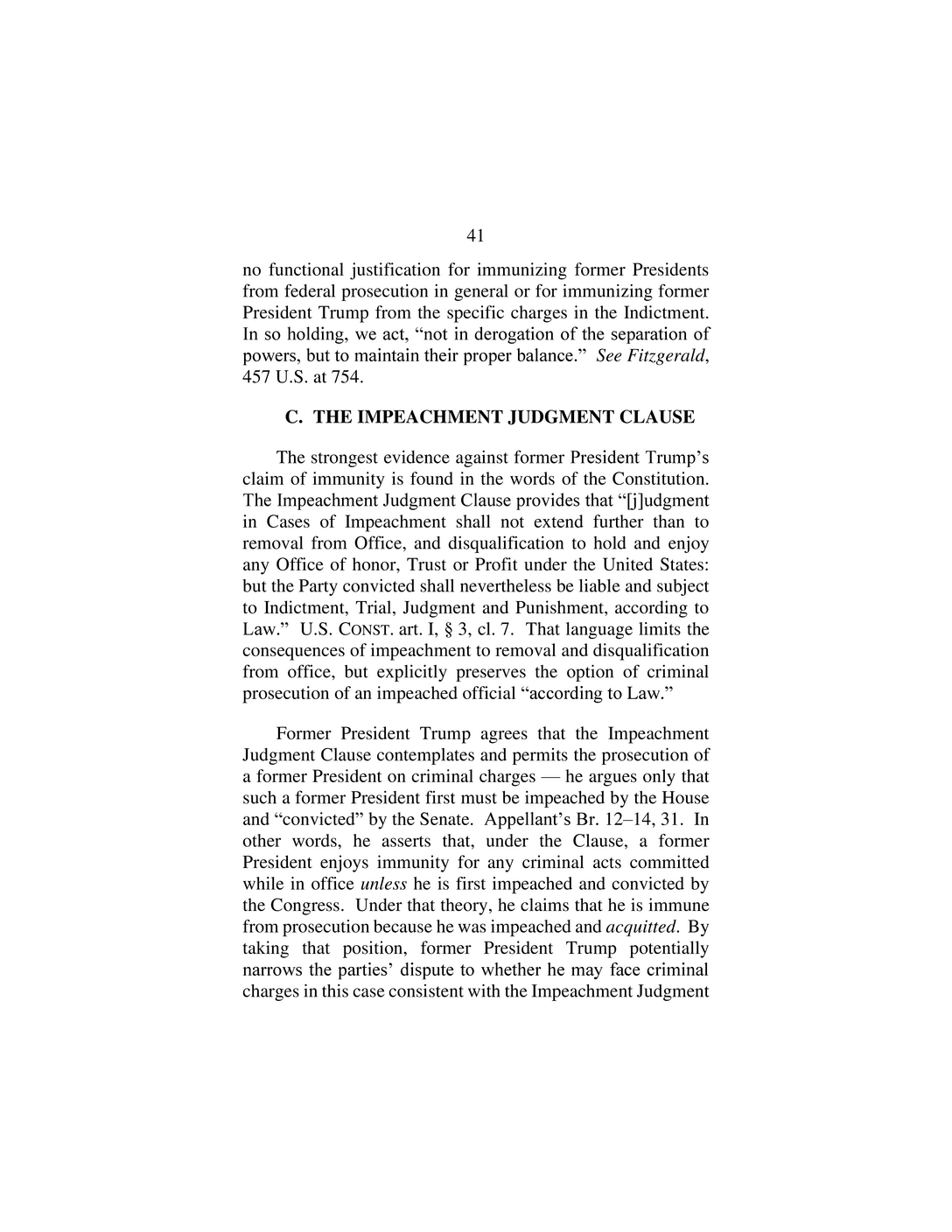
New York Times Analysis
« Previous Next »
Impeachment Clause
27
Mr. Trump had argued that this part of the Constitution means a president may only face criminal prosecution over an official action if he was first impeached and convicted by Congress. The court says the clause makes clear exactly the opposite: that impeachment and criminal prosecution are unrelated.
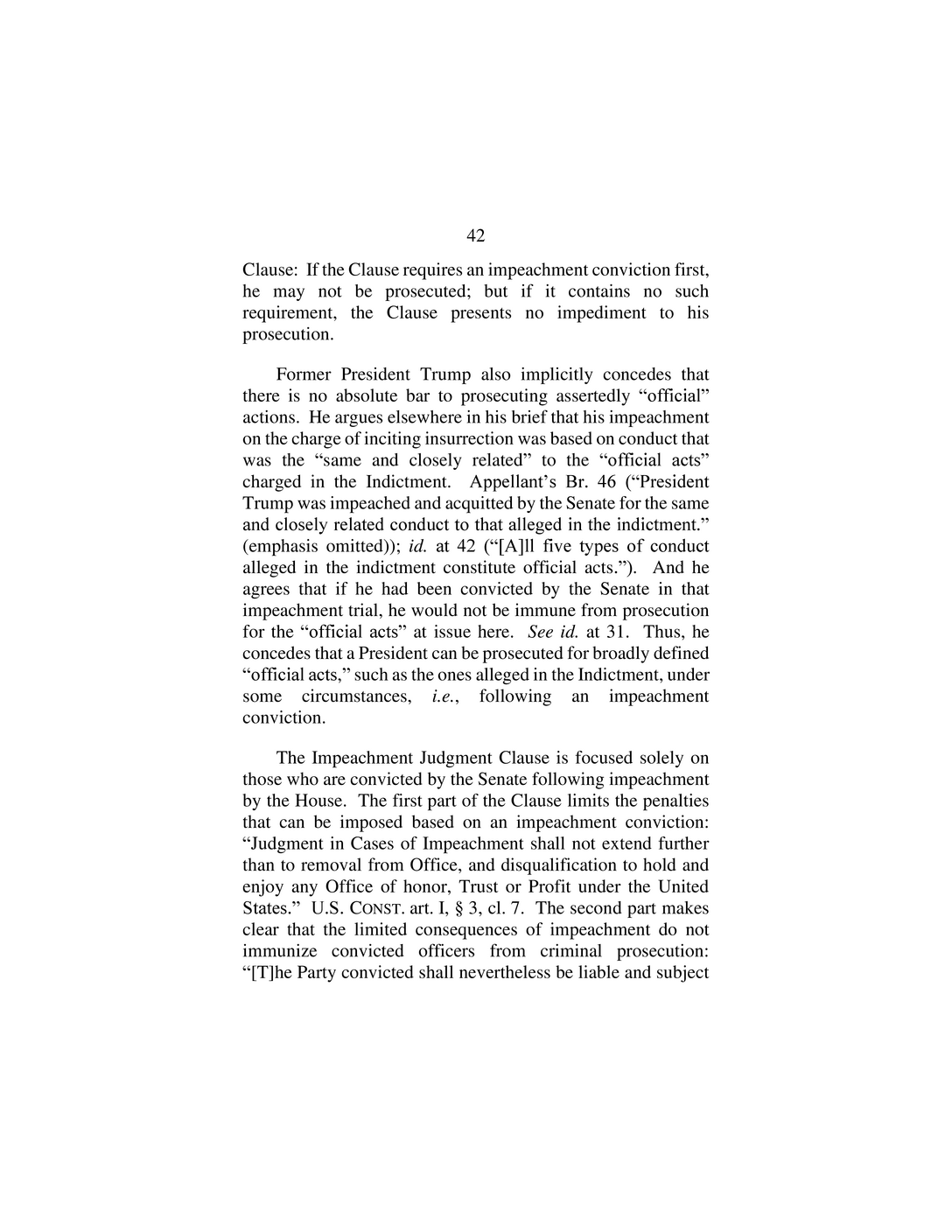
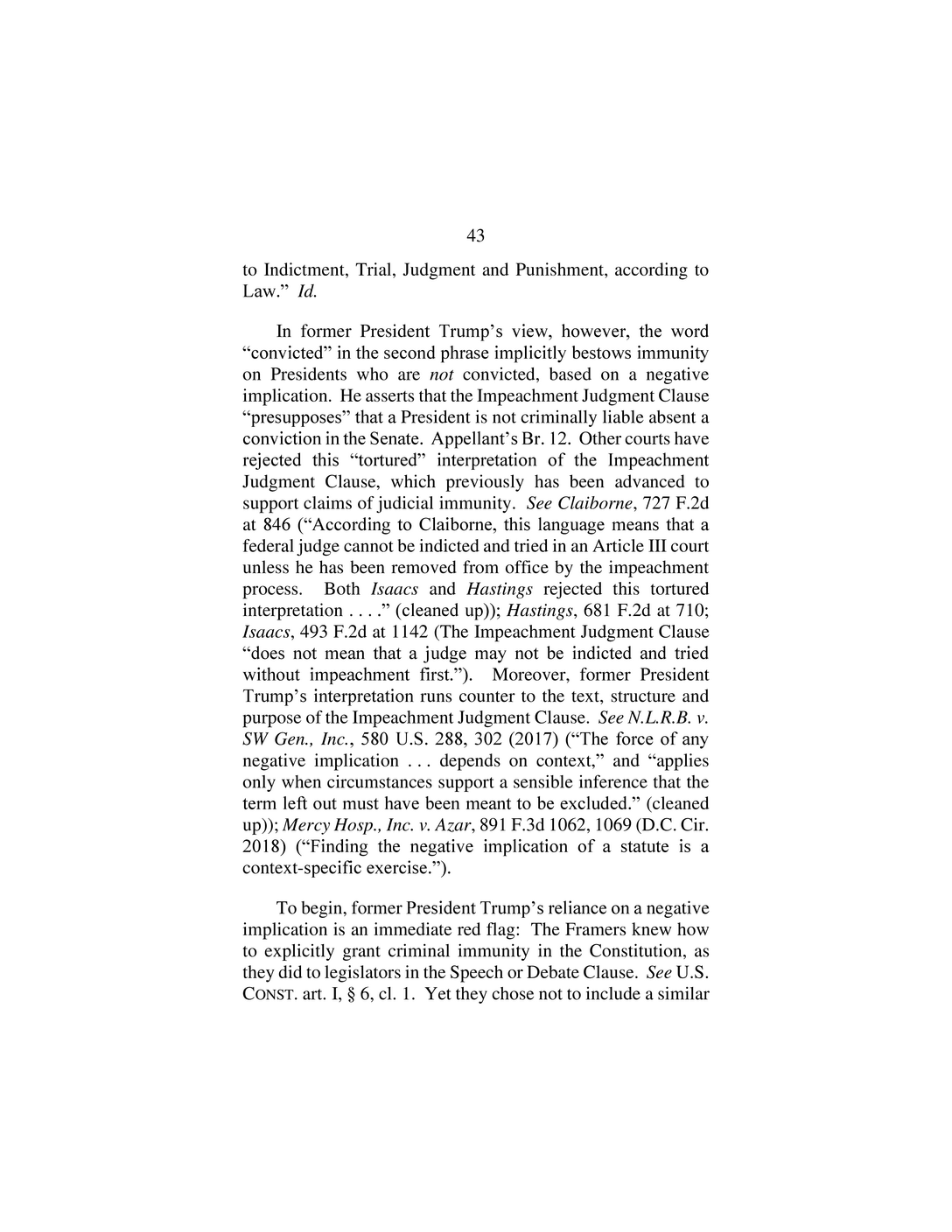
New York Times Analysis
« Previous Next »
Rejecting Trump’s Interpretation
28
The panel says Mr. Trump’s reading of the clause is wrong for a variety of reasons it goes on to explain.
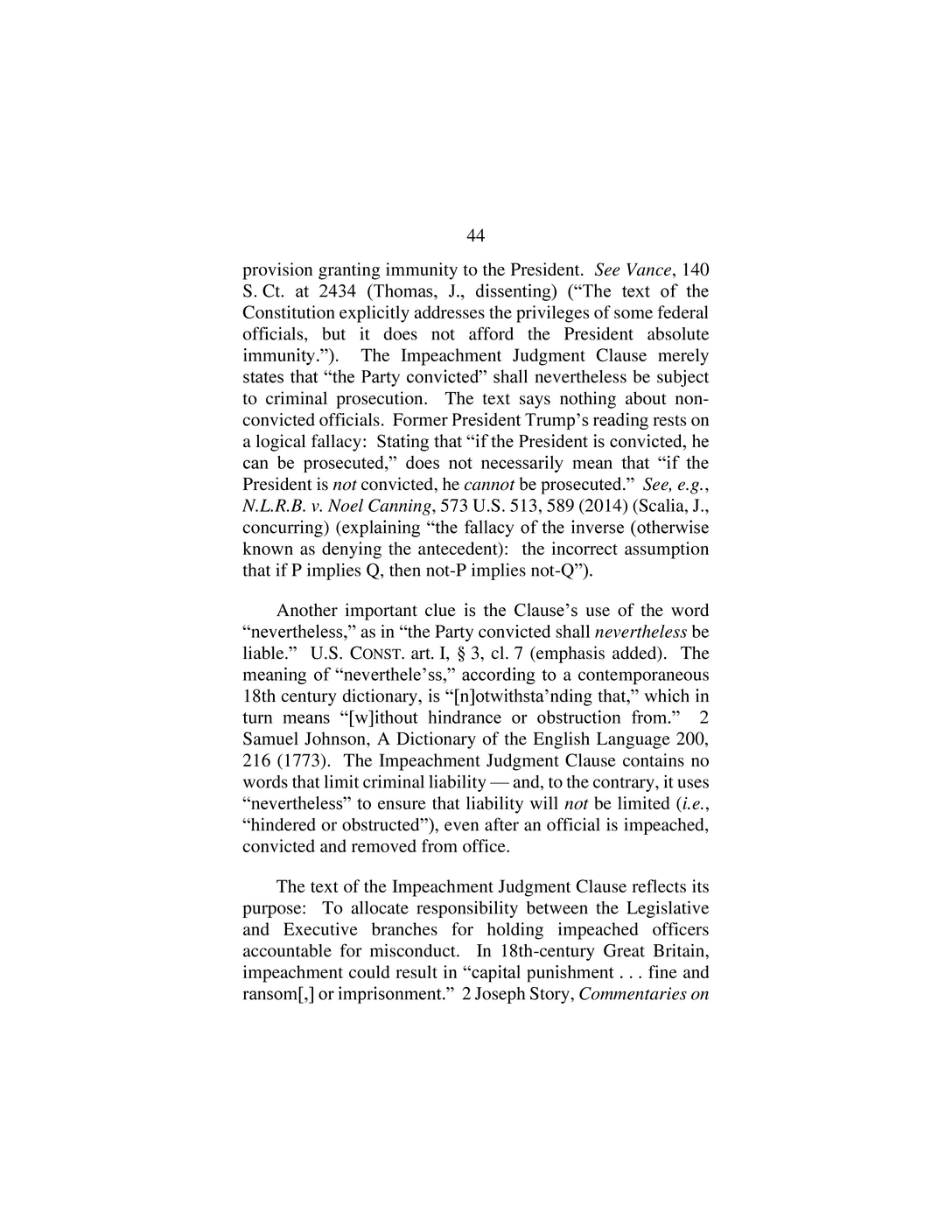
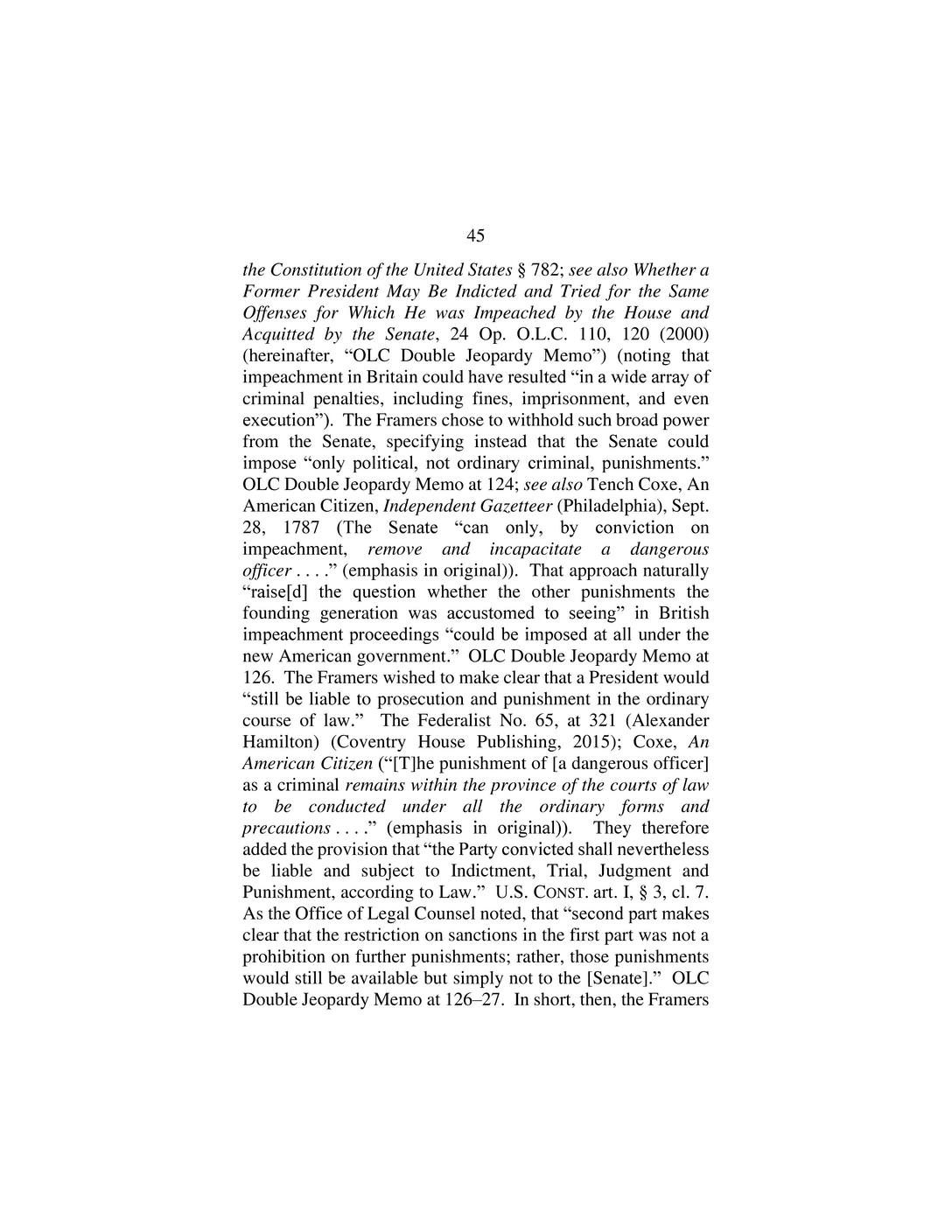
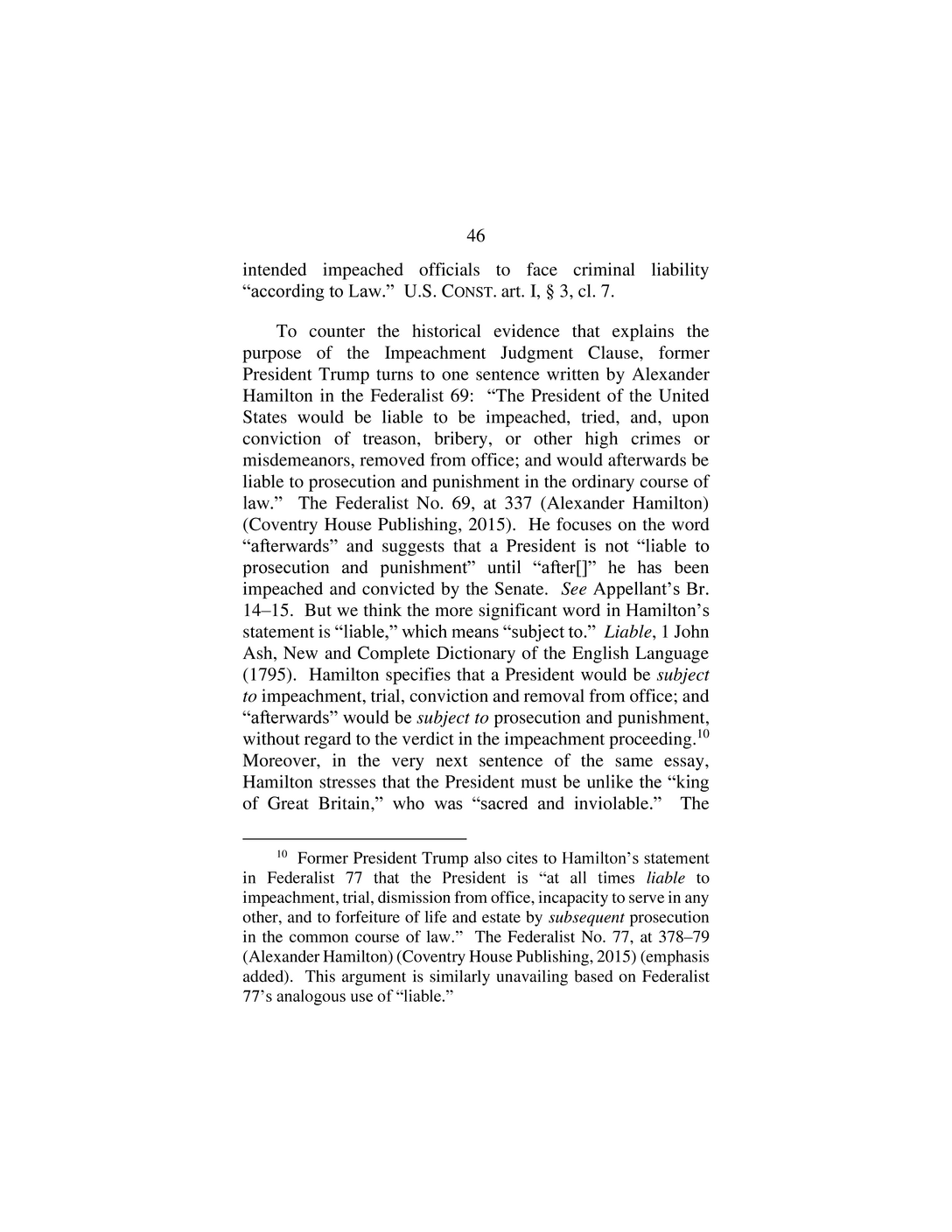
New York Times Analysis
« Previous Next »
Federalist No. 69
29
The panel disagrees with Mr. Trump’s reading of one of the Federalist Papers, essays written by three founders — in this case Alexander Hamilton — to explicate the meaning of the Constitution during the debate over its ratification.
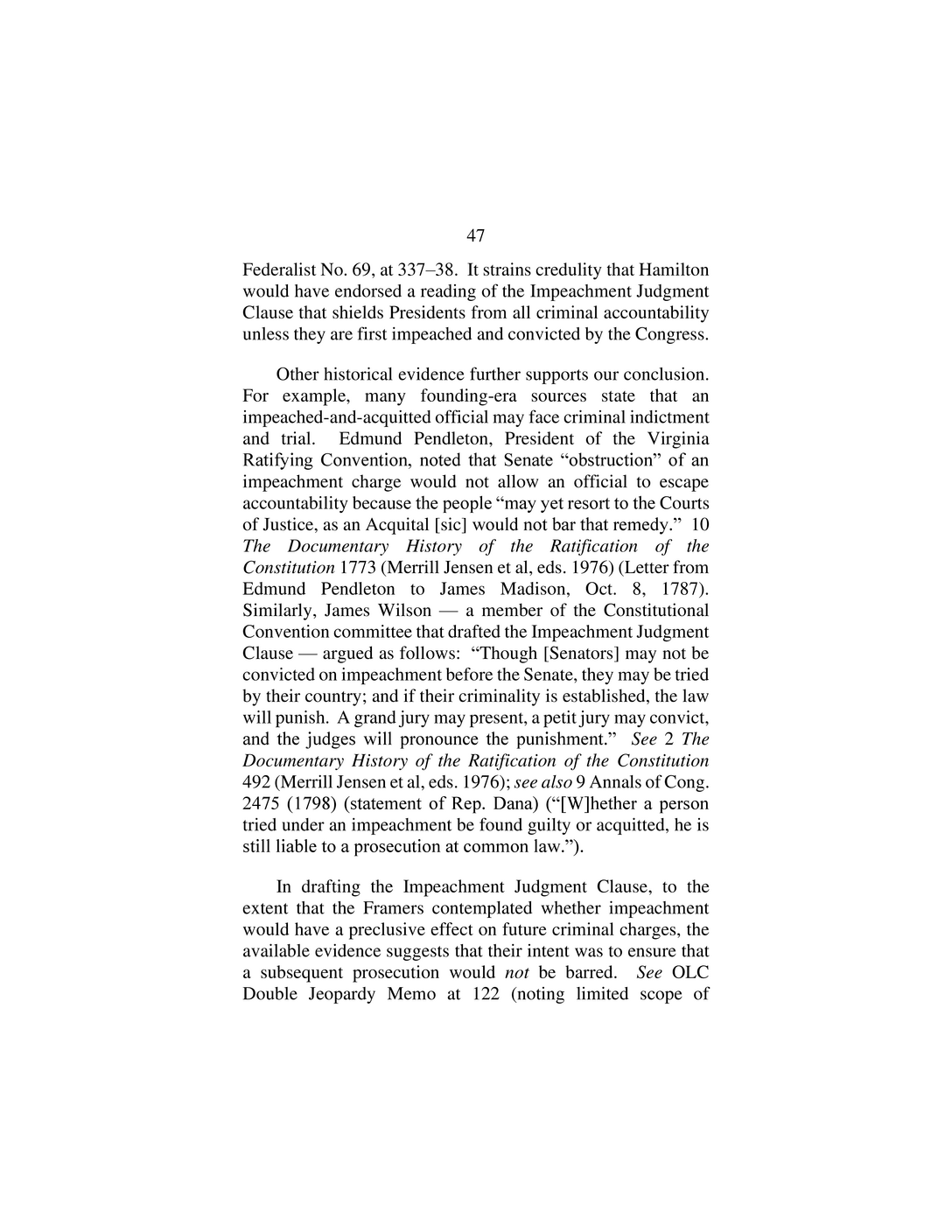
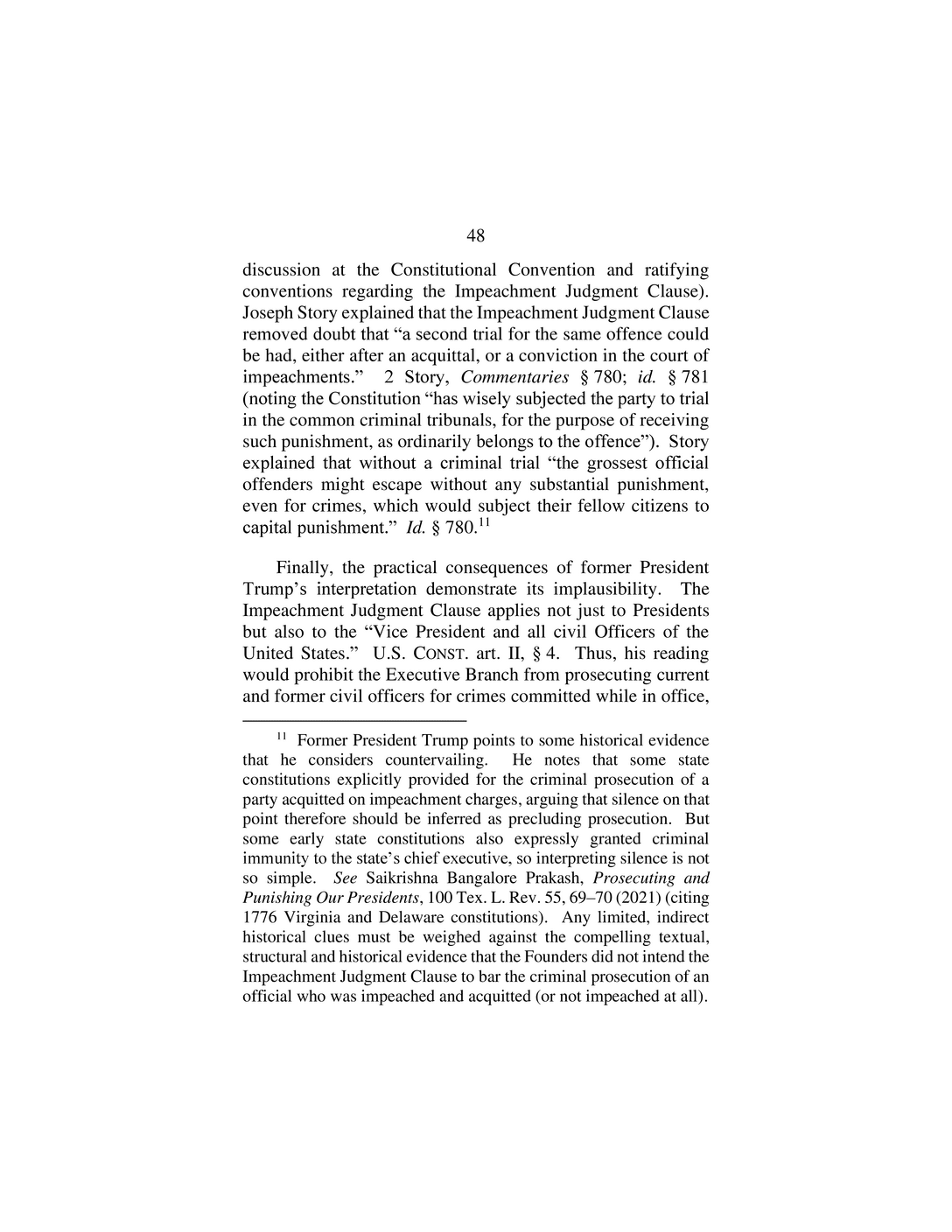
New York Times Analysis
« Previous Next »
An Implausible Reading
30
Among other things, Mr. Trump’s reading of the clause would mean that all civil officers of the United States are immune from prosecution for crimes committed while in office unless the Senate first impeaches and convicts them.
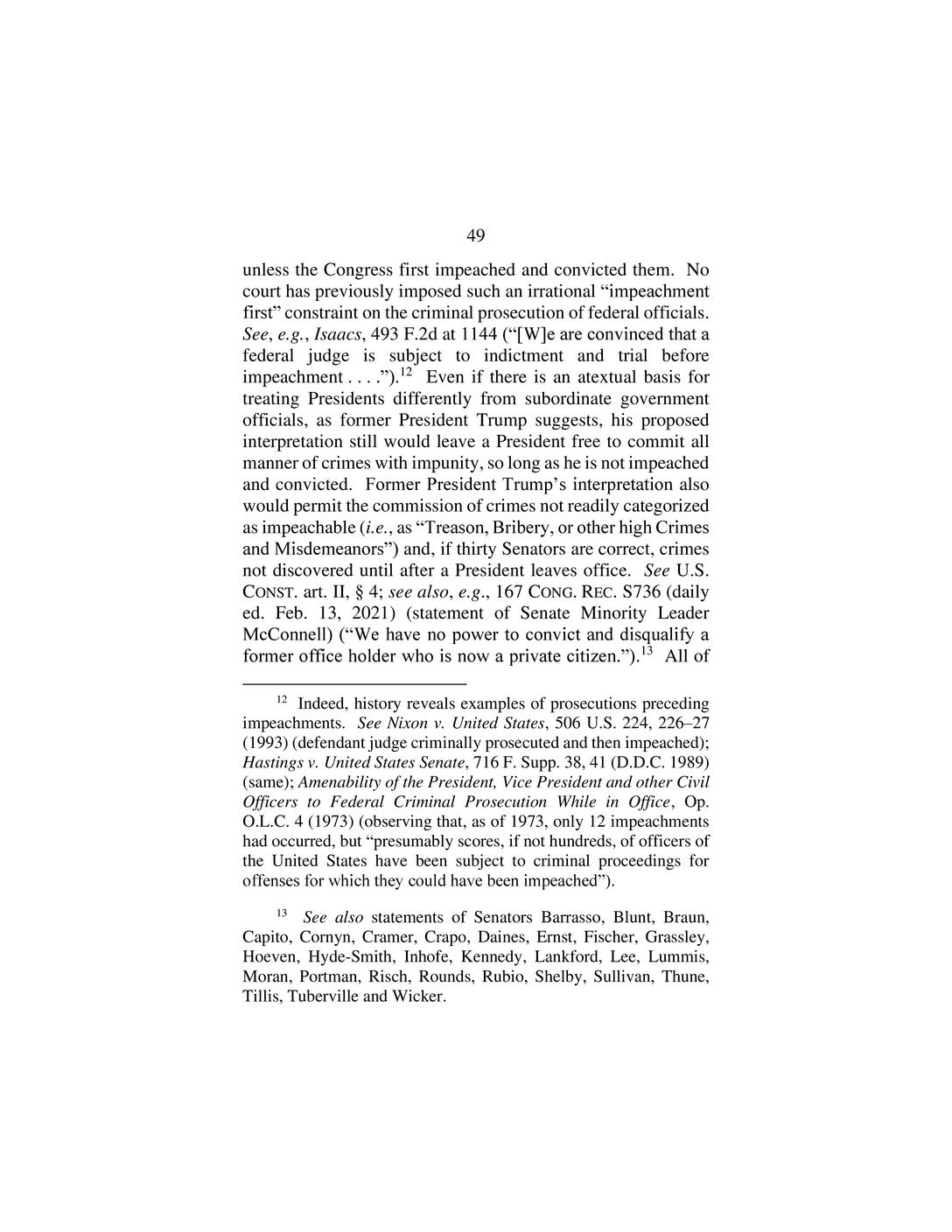
New York Times Analysis
« Previous Next »
Committing Crimes With Impunity
31
Among other things, the panel notes here that 30 Republican senators cited the fact that Mr. Trump was no longer in office as a basis to acquit him at his second impeachment trial. While those senators’ expressed view is contested, the implication is that presidents could commit crimes late in their administration —when there is not enough time for a trial before they leave office — with no recourse.
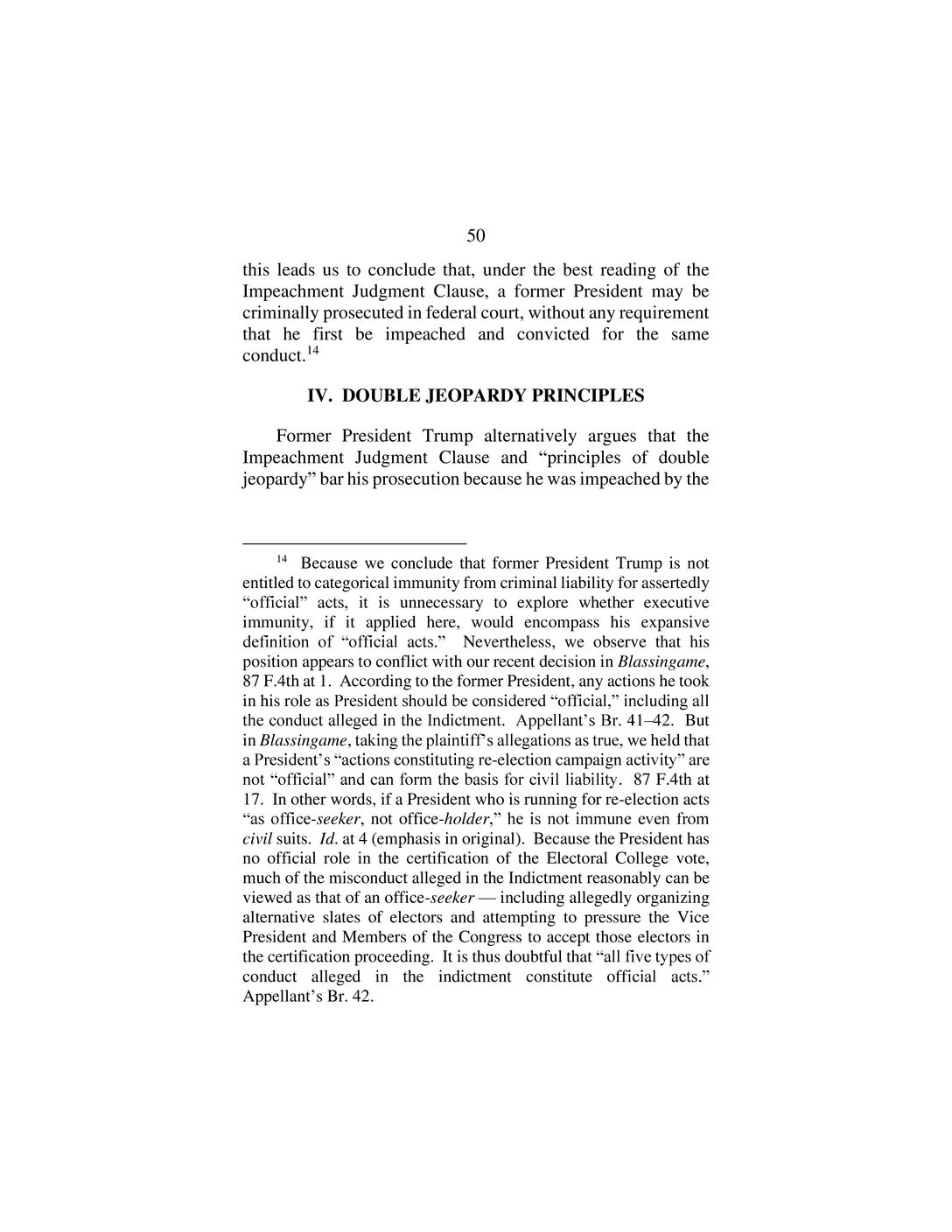
New York Times Analysis
« Previous Next »
Were the Acts Official?
32
Since the panel has decided that former presidents don’t have criminal immunity for official actions, it doesn’t matter whether Mr. Trump’s actions were undertaken in his official capacity as president or his personal capacity as a candidate for office. Nevertheless, the judges suggest they were probably in the last category. That issue matters in a civil lawsuit brought against Mr. Trump by the Capitol police and lawmakers caught up in the Jan. 6 riot, since presidents have immunity from being sued over their official actions but not their personal ones.
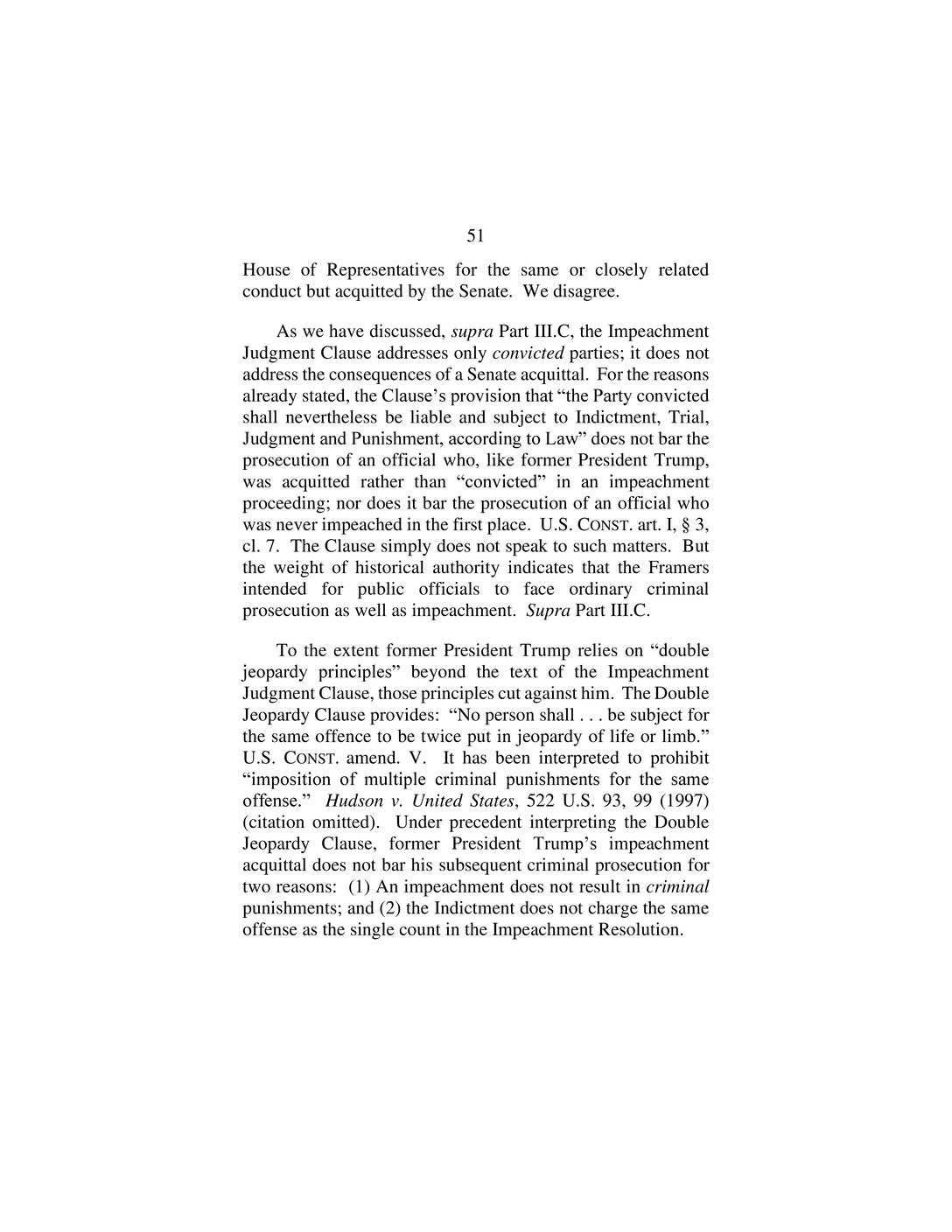
New York Times Analysis
« Previous Next »
Different From Impeachment Case
33
Mr. Trump had argued that he is facing double jeopardy since he was already tried in the impeachment case over the events of Jan. 6. The panel rejects that argument for several reasons, including that impeachment is not a criminal proceeding and the charge he faced before Congress — inciting the riot — is not among the offenses listed in the criminal indictment.
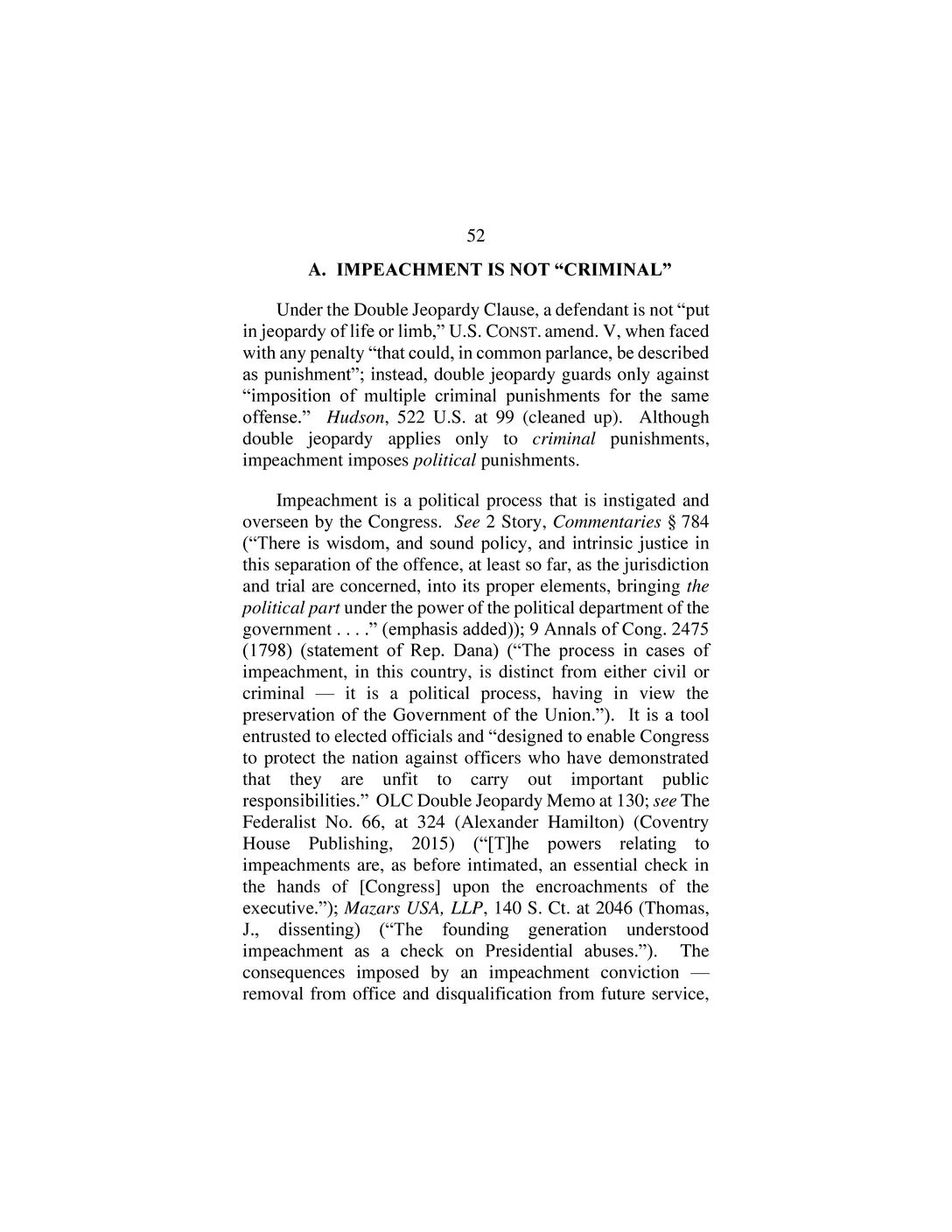
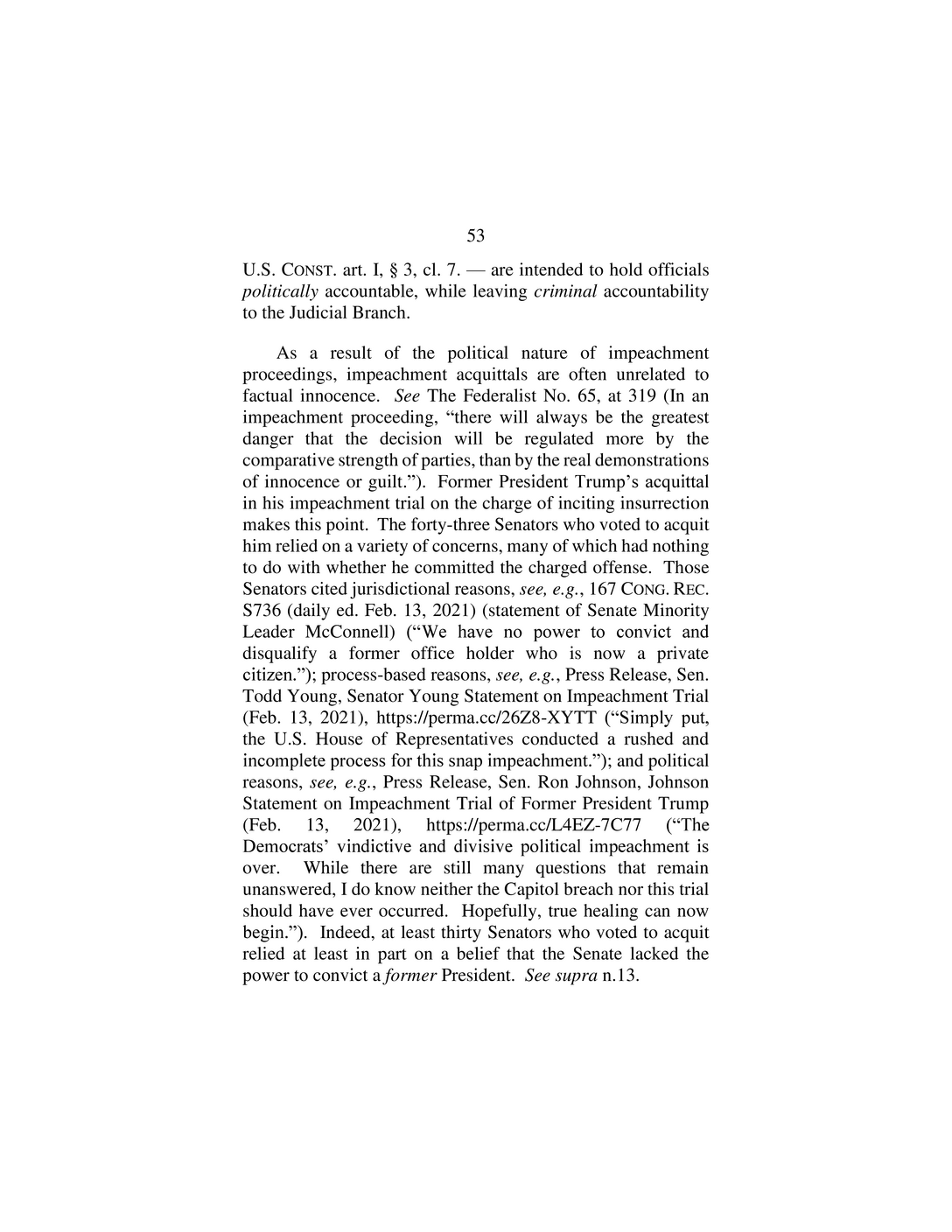
New York Times Analysis
« Previous Next »
Impeachment Acquittals Are Political
34
The panel notes that being acquitted in an impeachment trial is “often” unrelated to factual innocence. It goes on to observe, “The 43 senators who voted to acquit him relied on a variety of concerns, many of which had nothing to do with whether he committed the charged offense.”
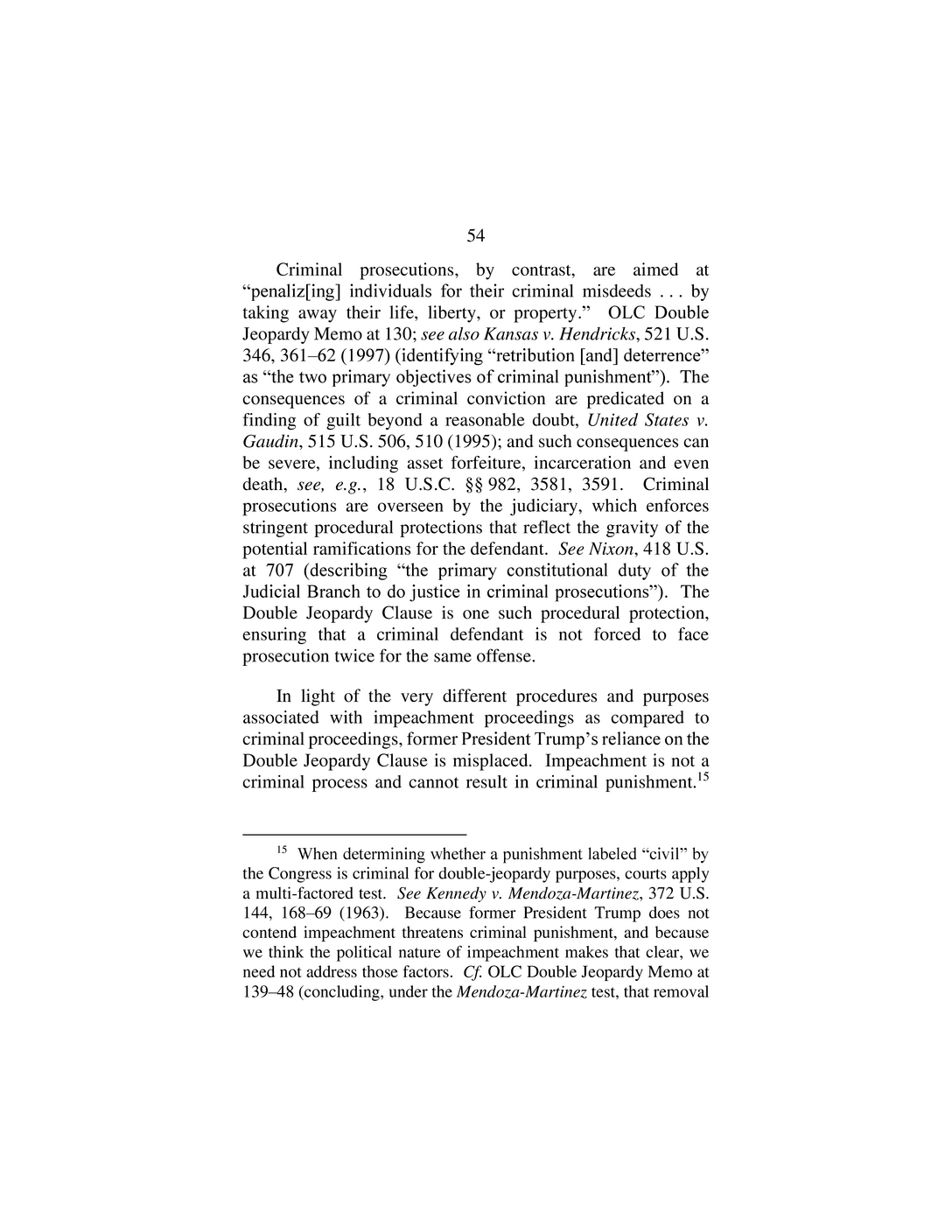
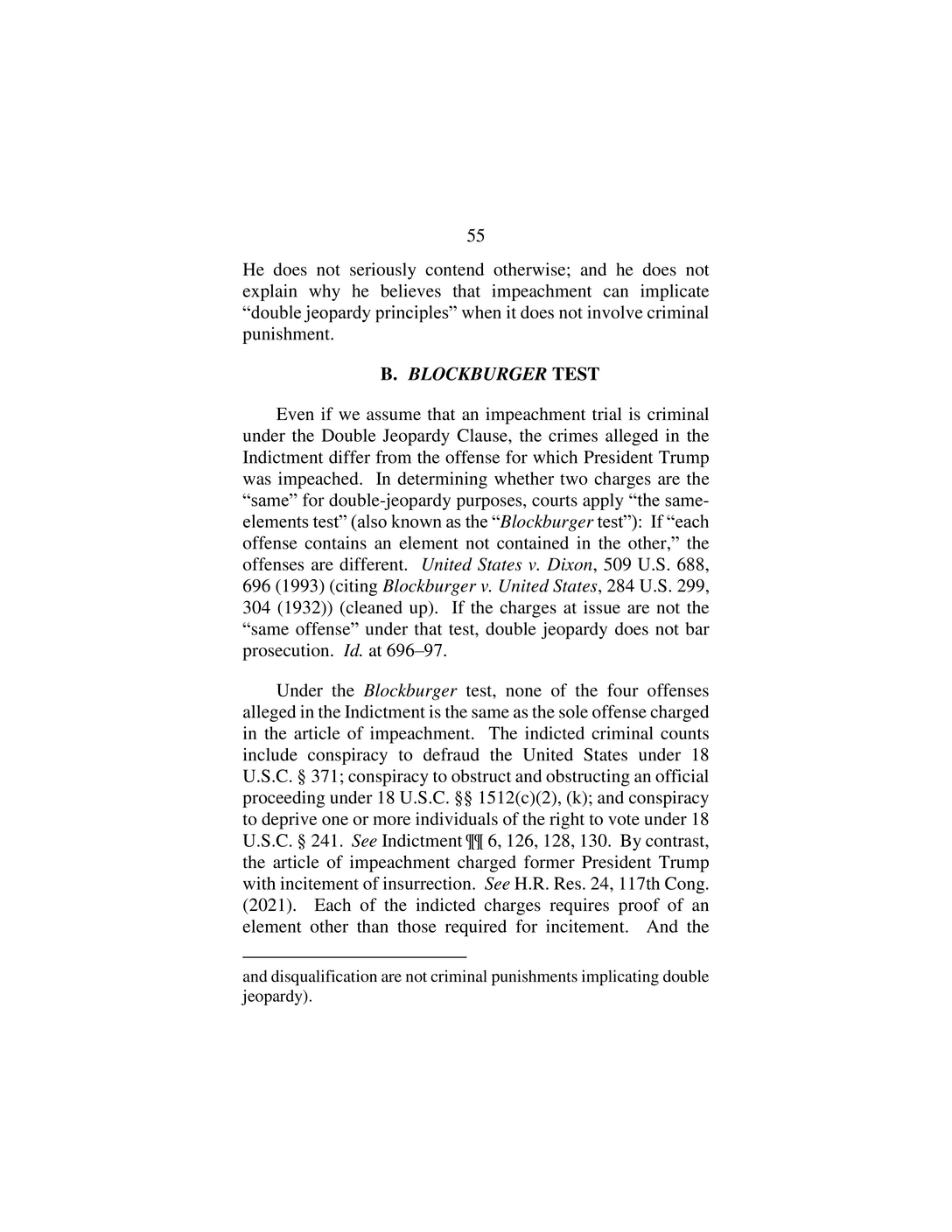
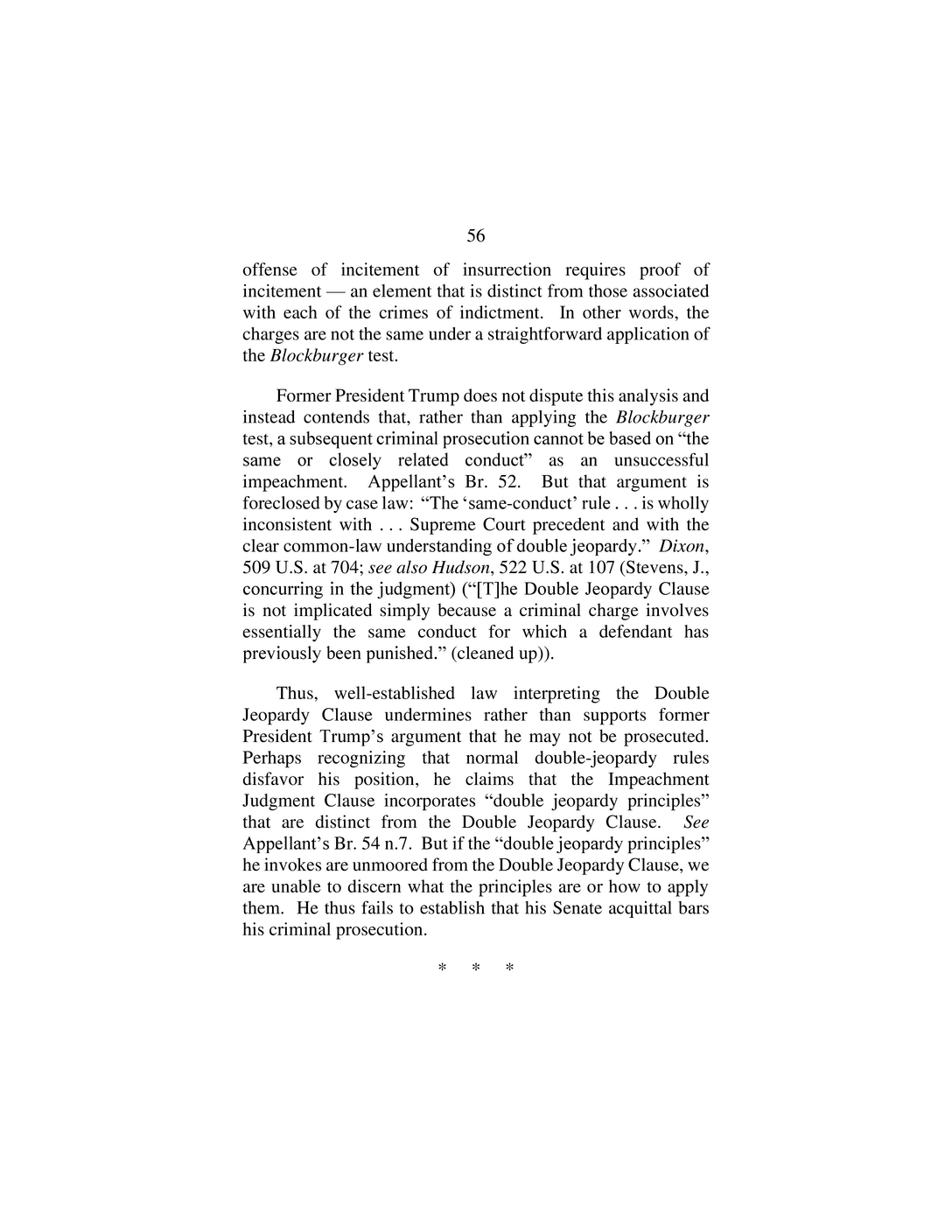
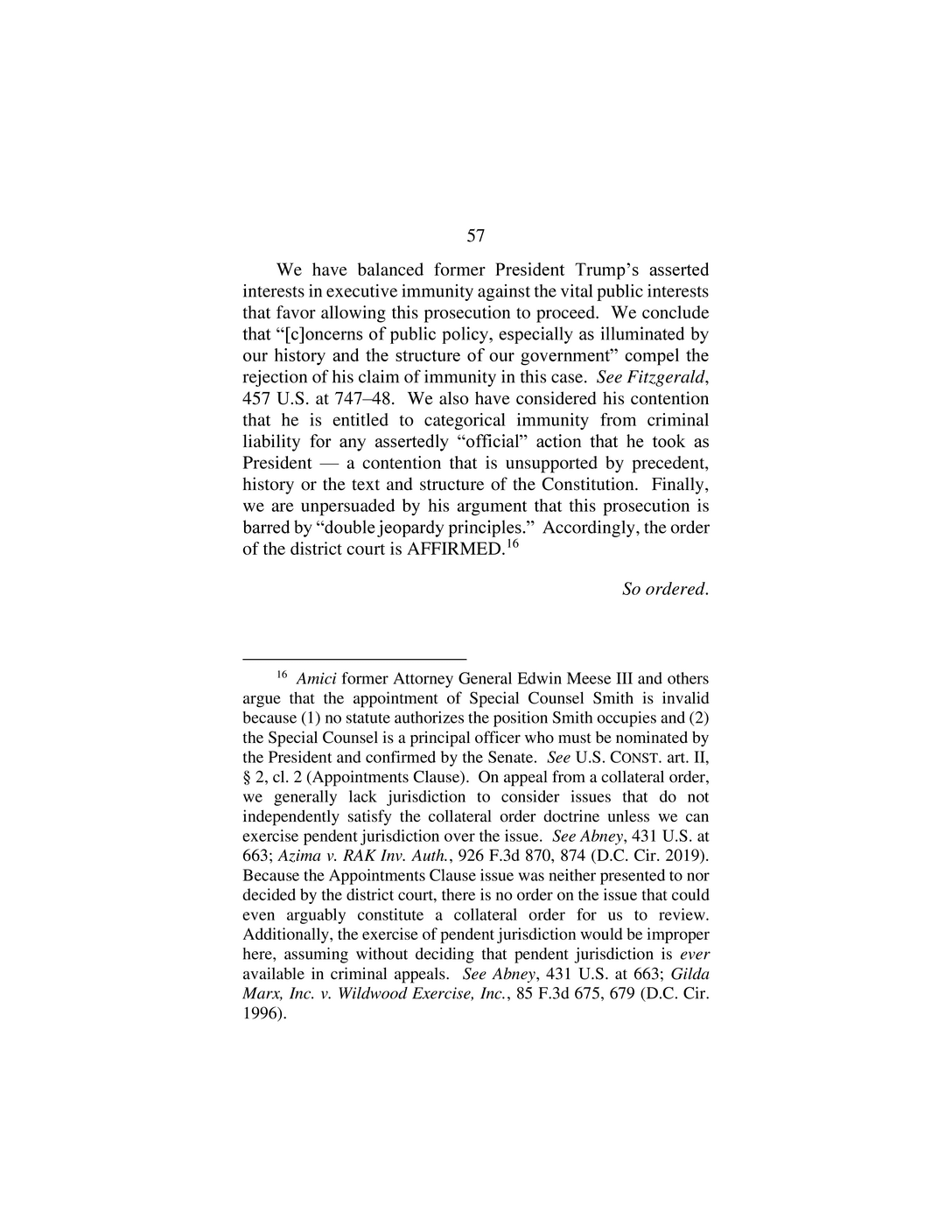
New York Times Analysis
« Previous
Summing It Up
35
The panel wraps up its unsigned opinion by restating the bottom line: Mr. Trump’s claim of criminal immunity for any claimed “official” actions as president is legally baseless and the prosecution is not barred by “double jeopardy” principles despite his impeachment acquittal.
Read the full article Here


